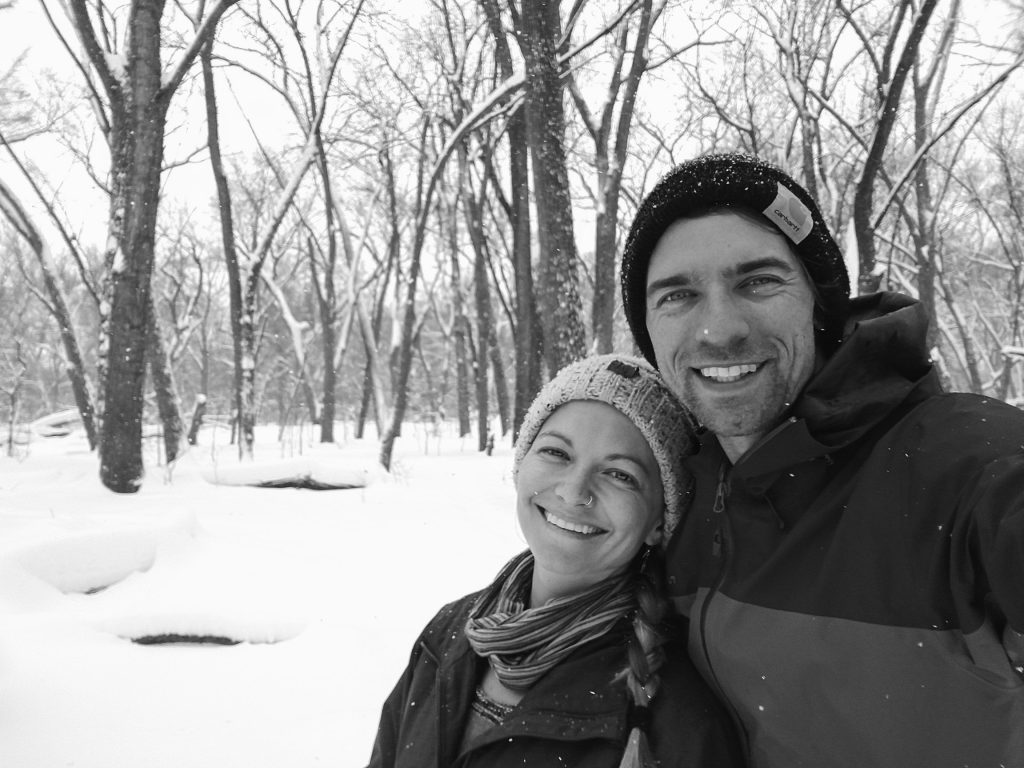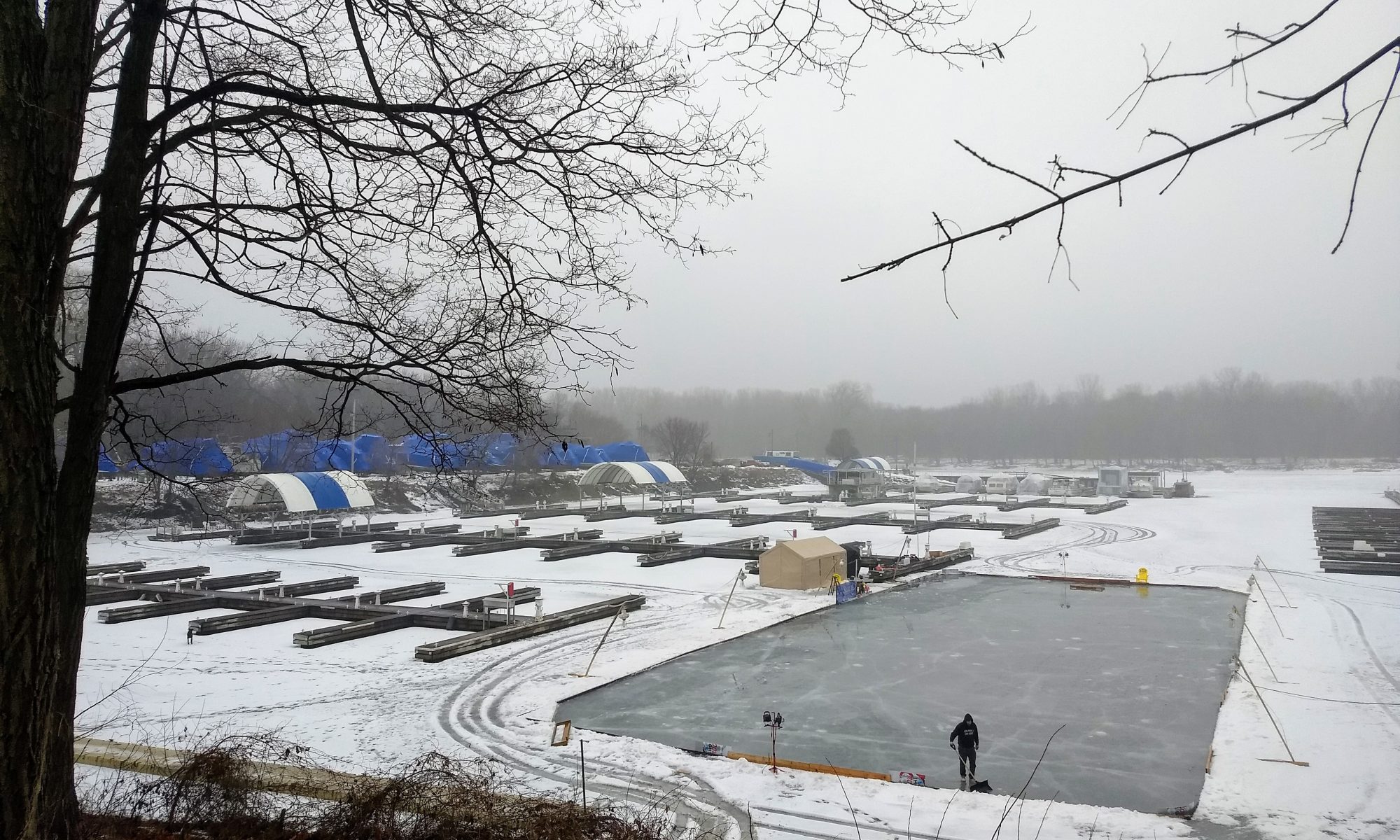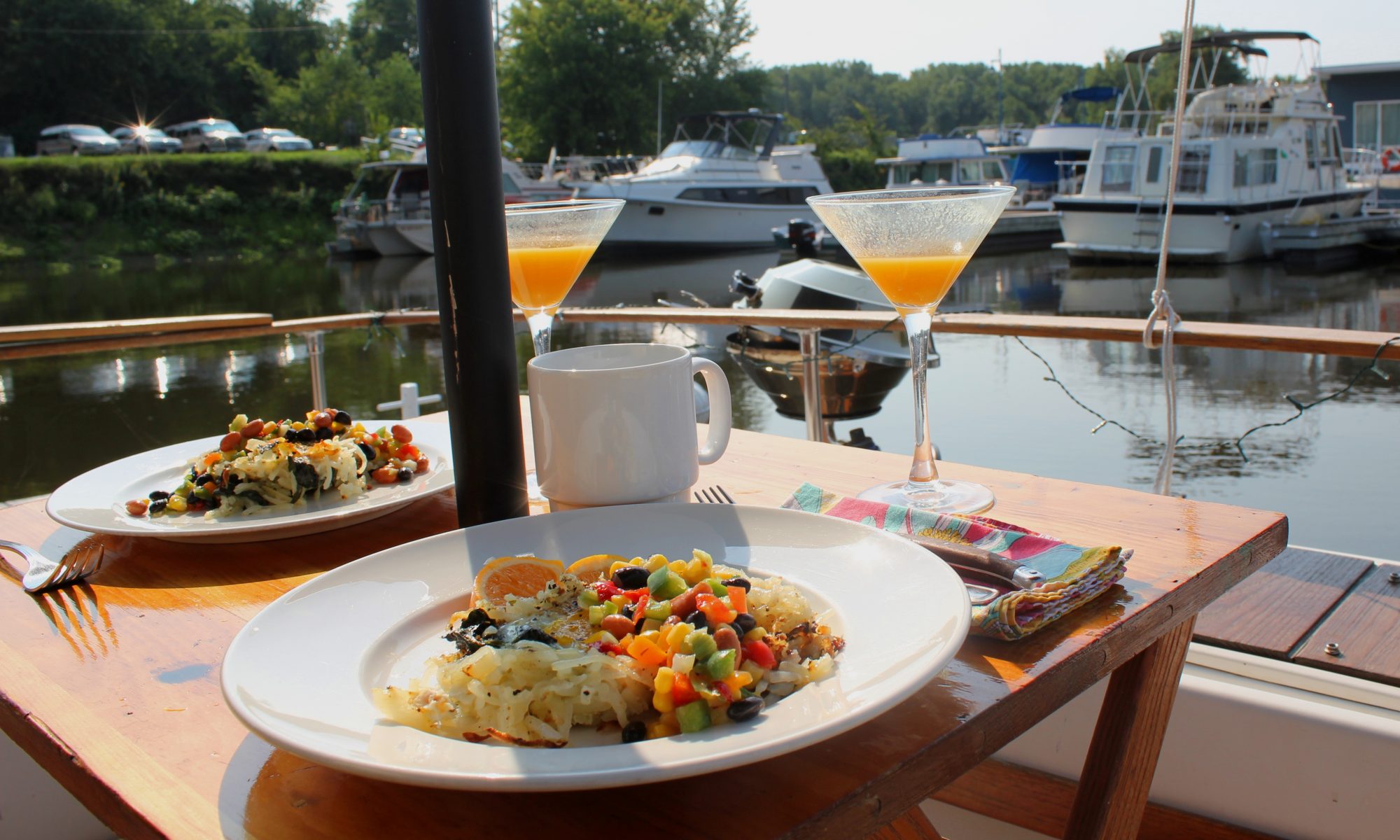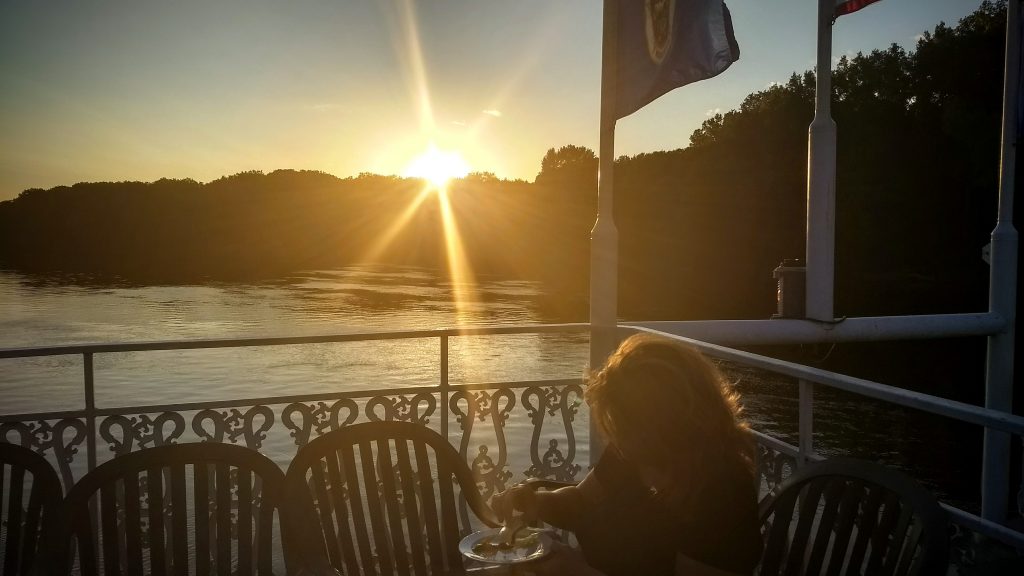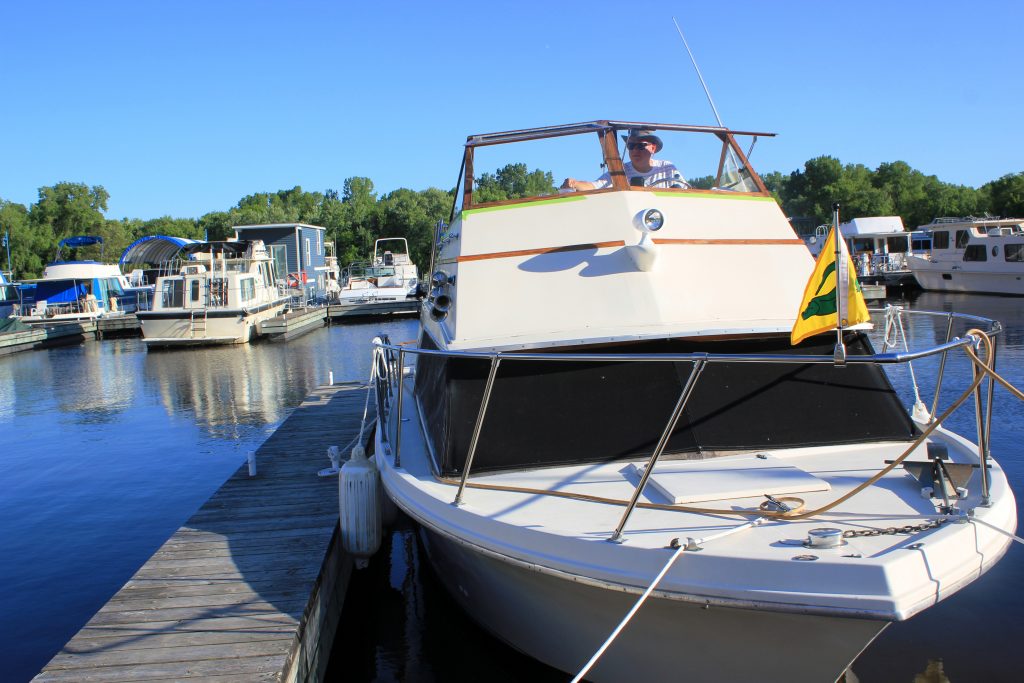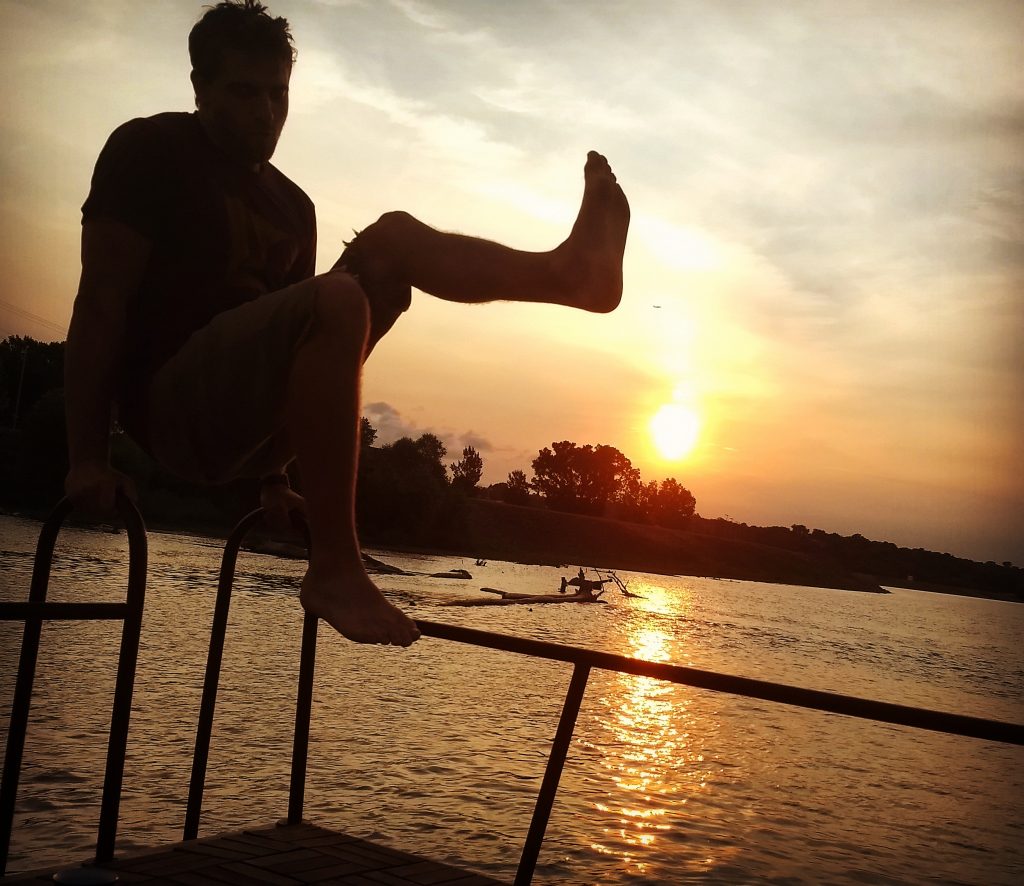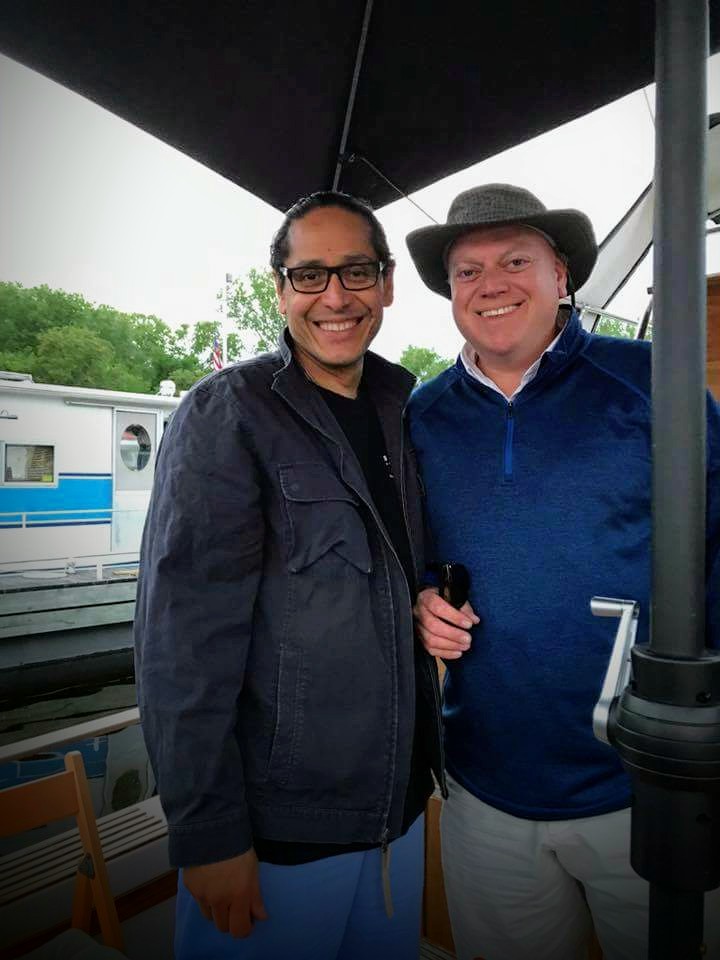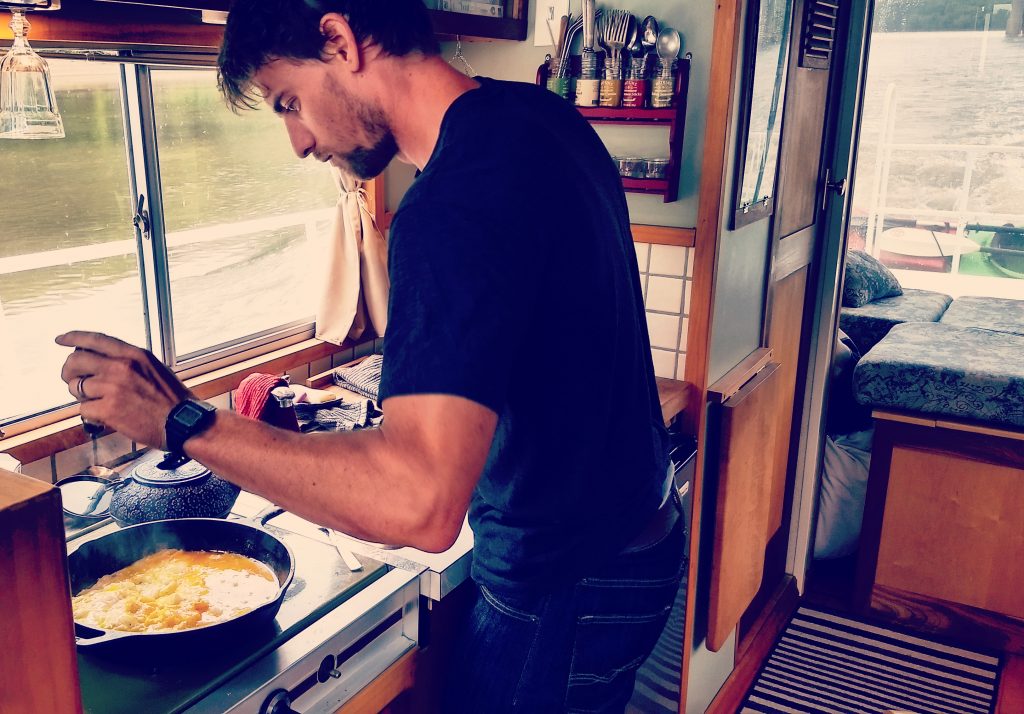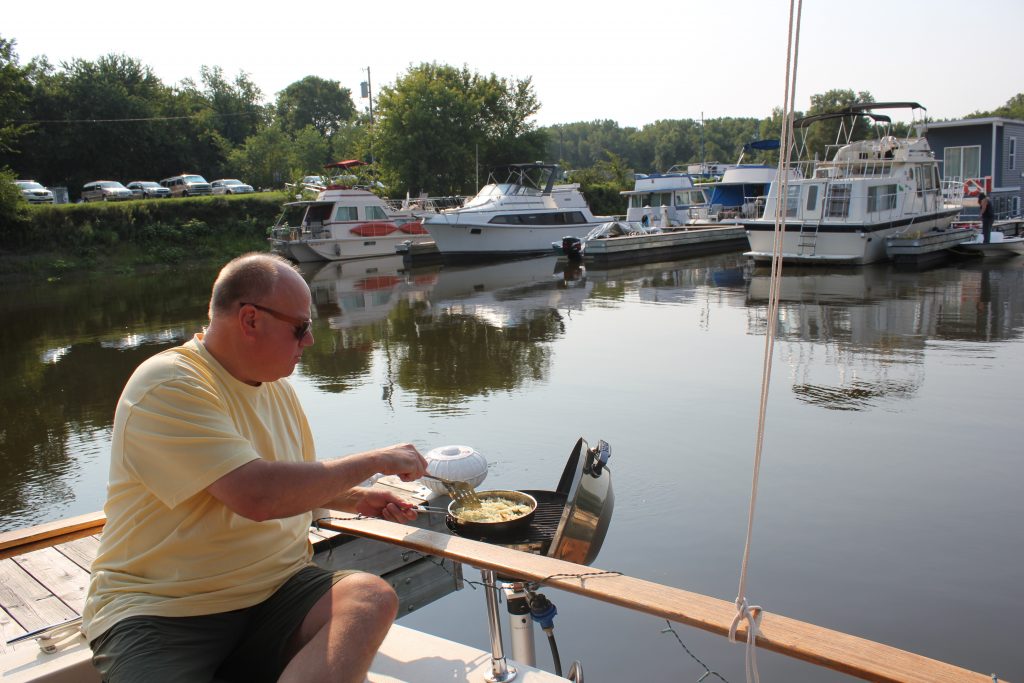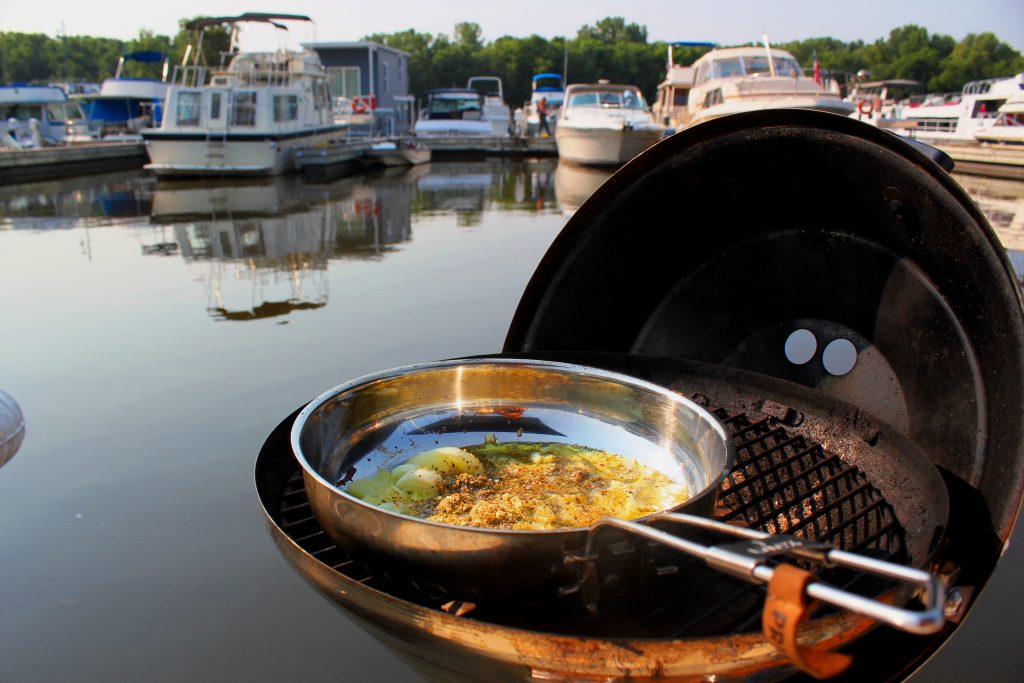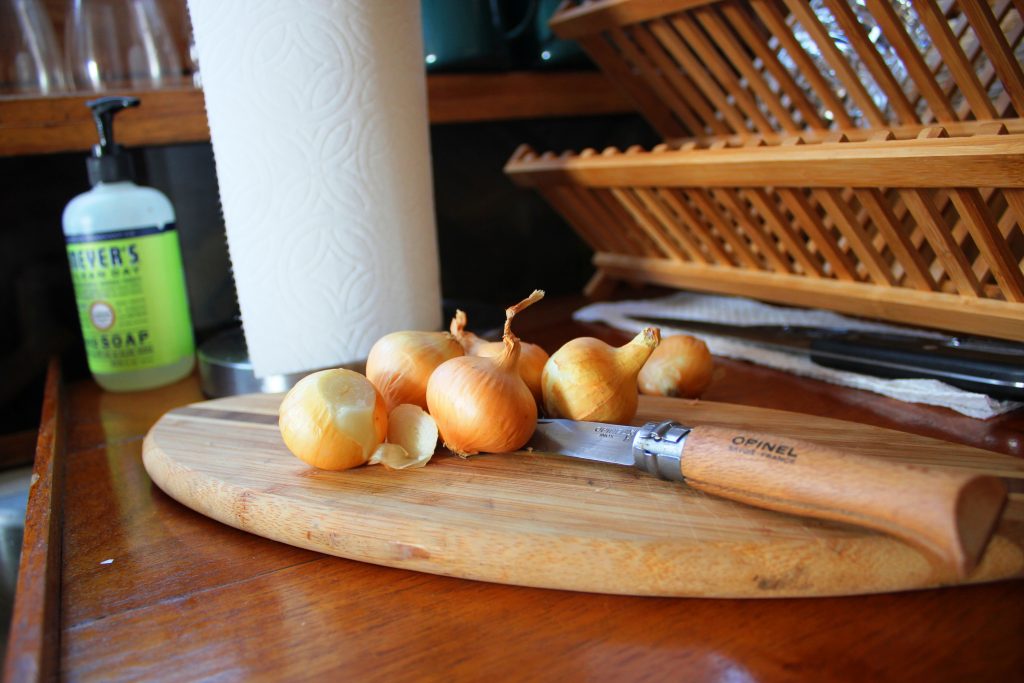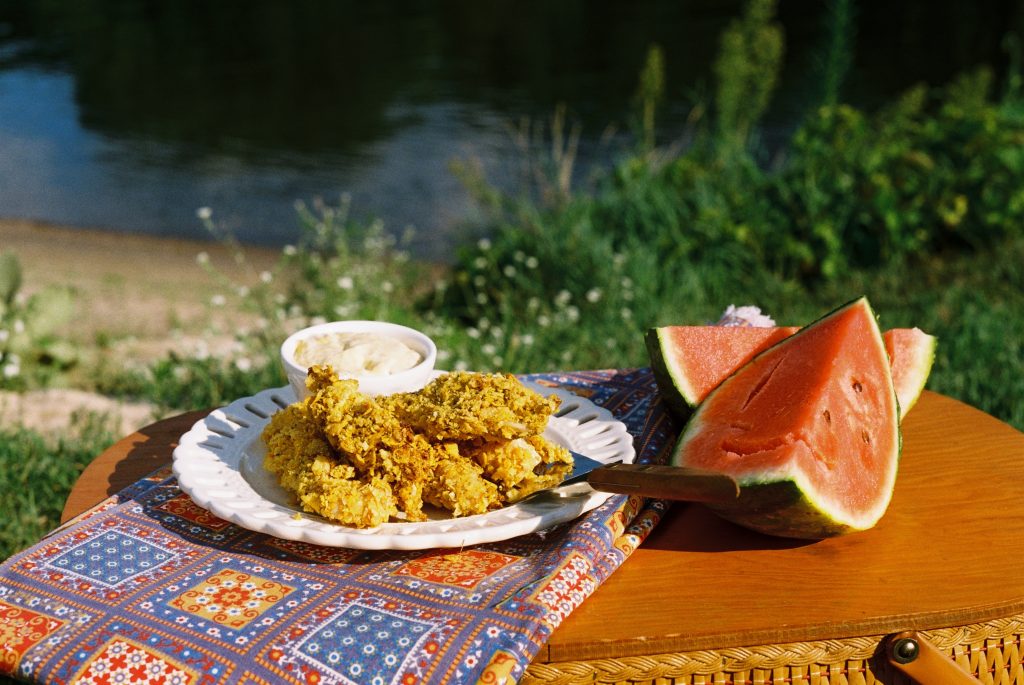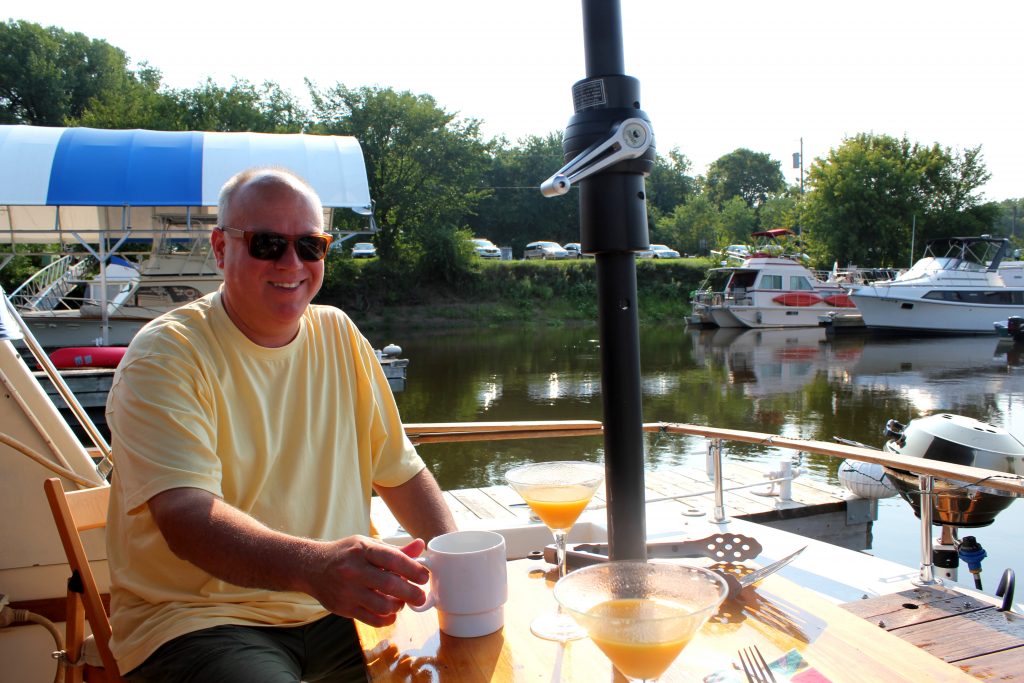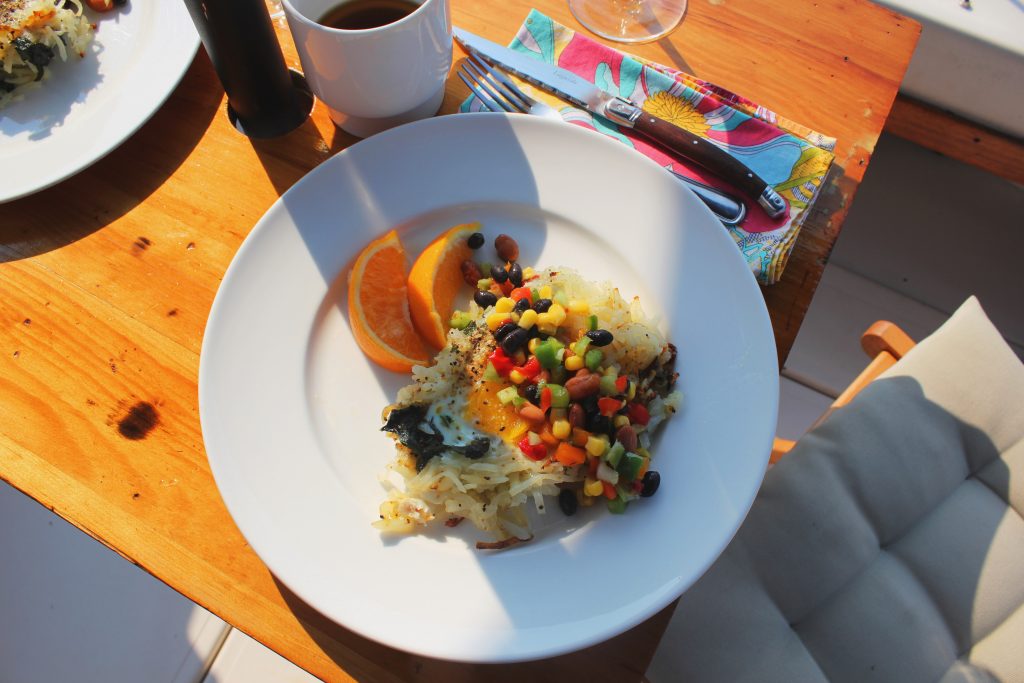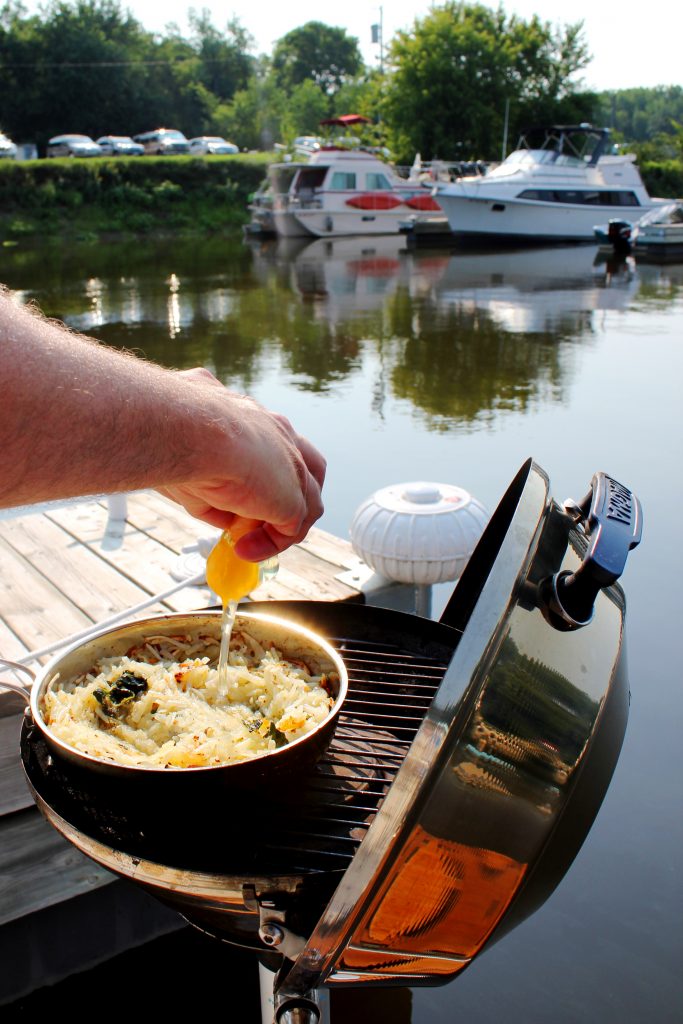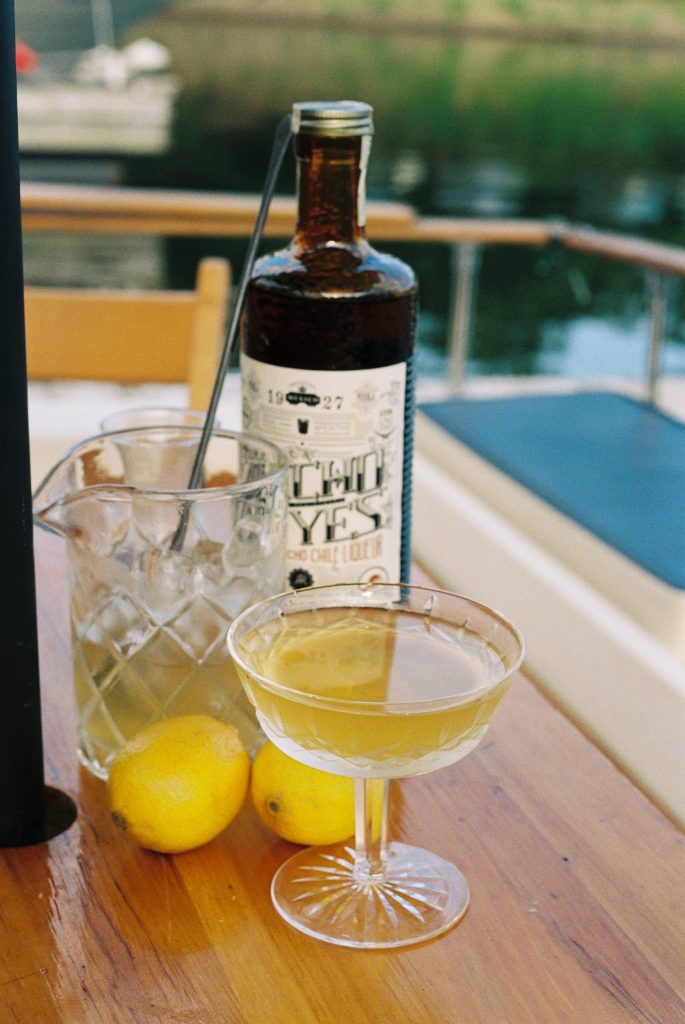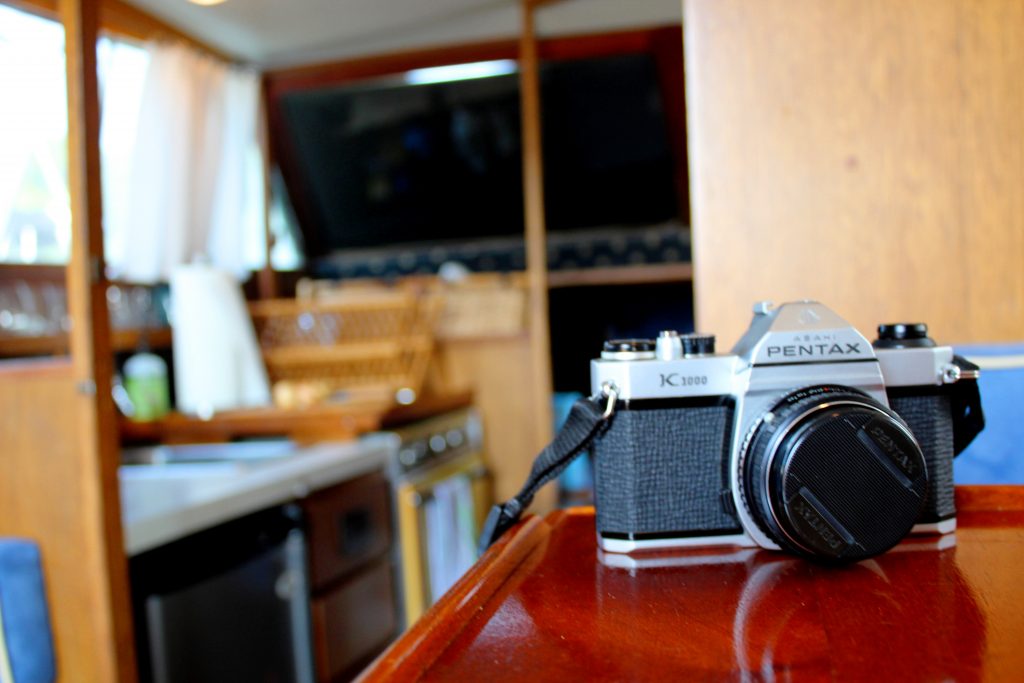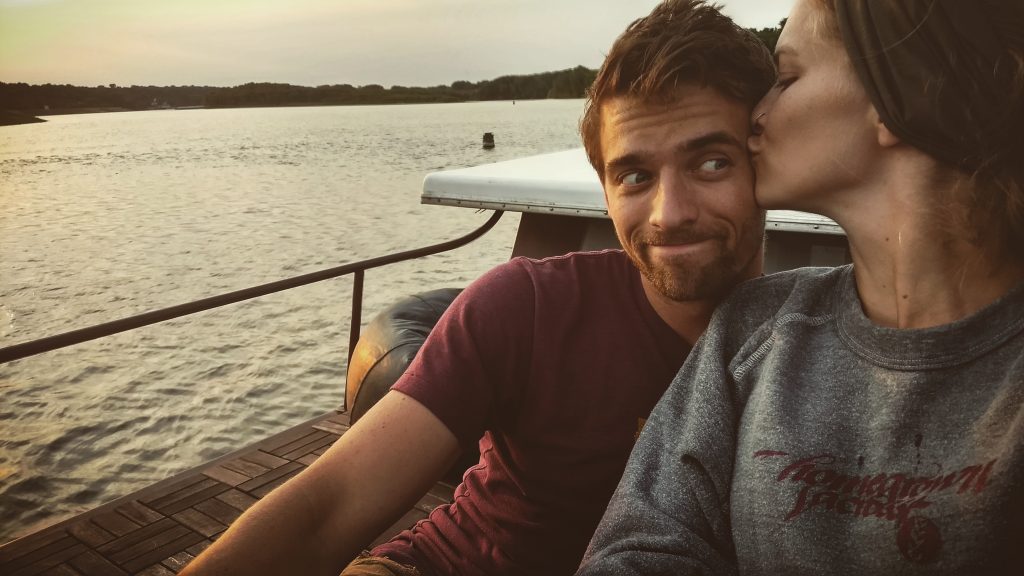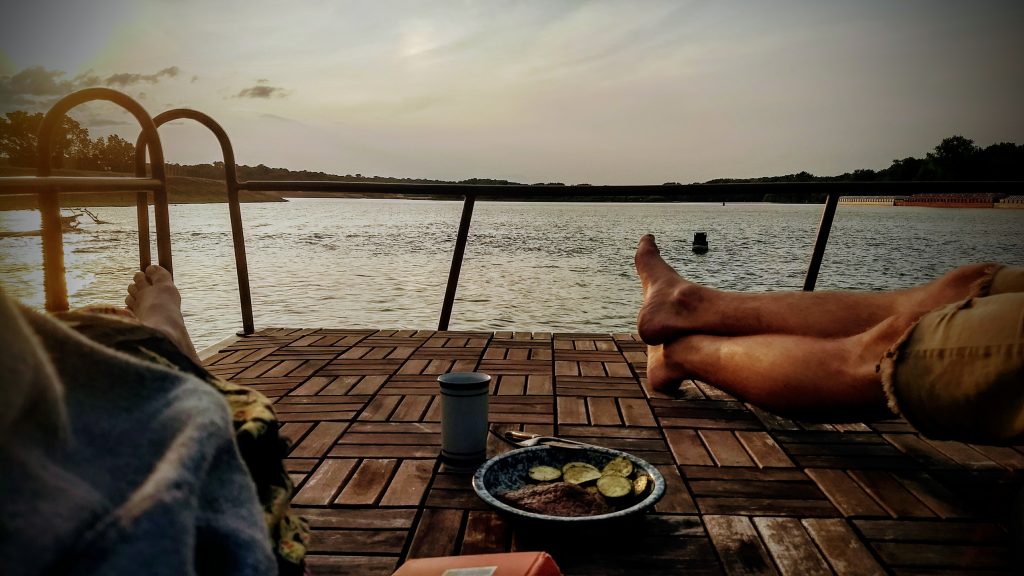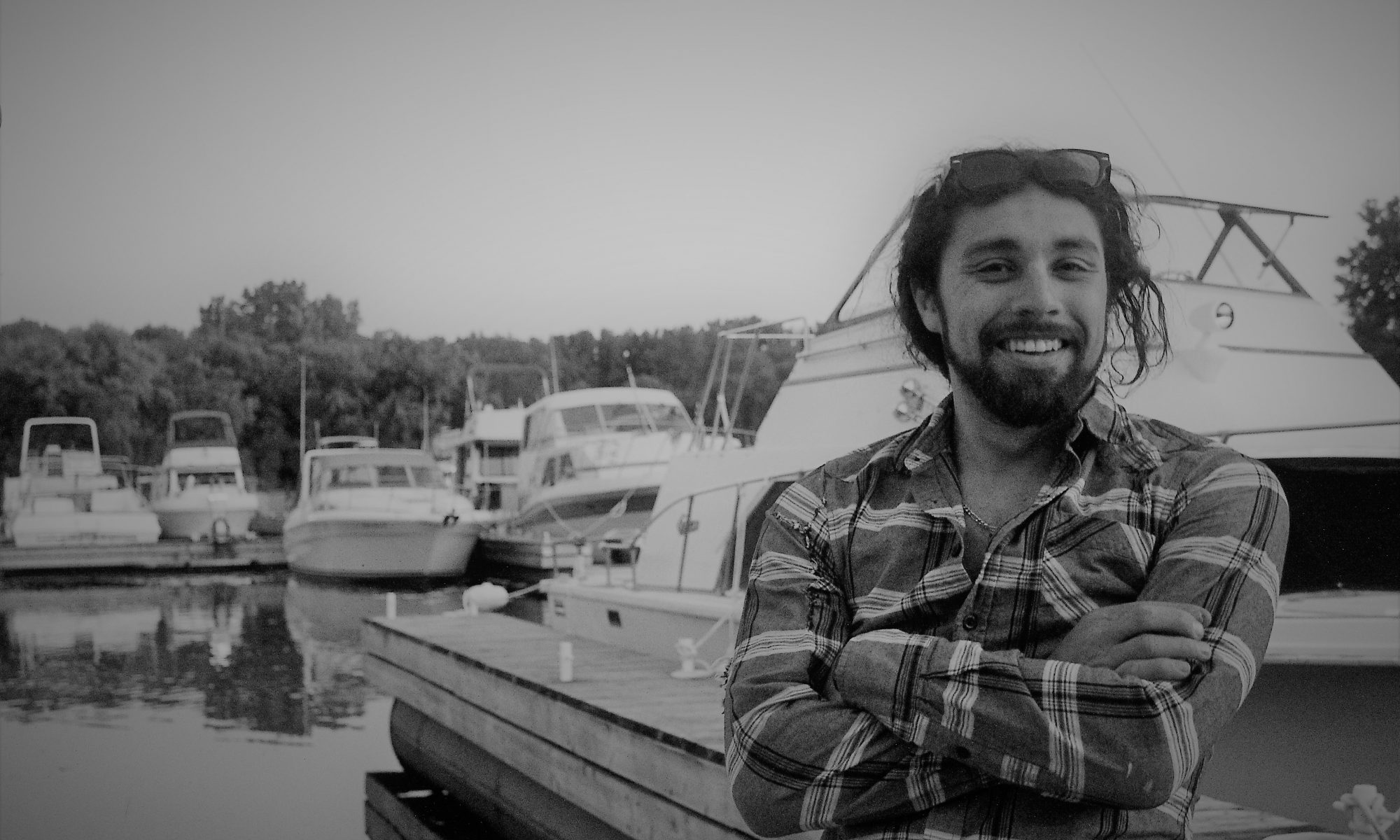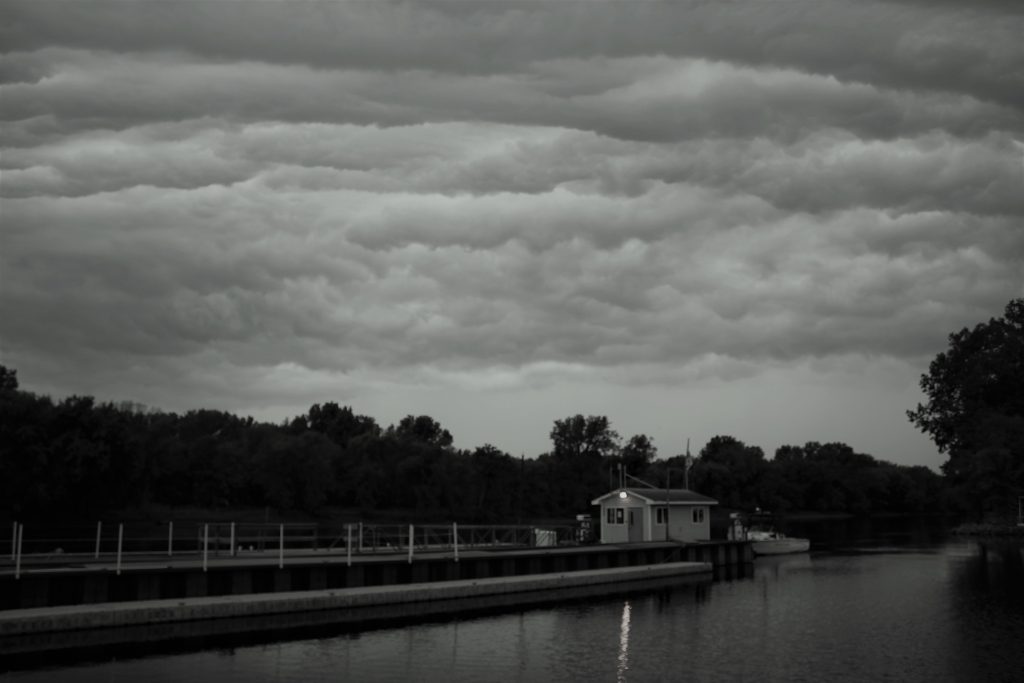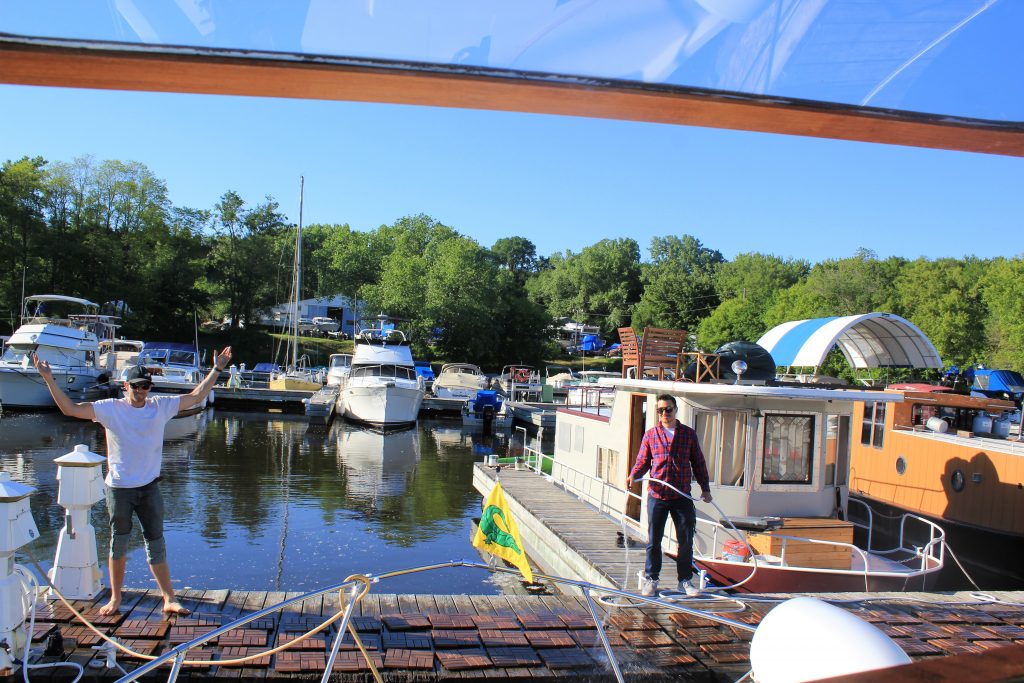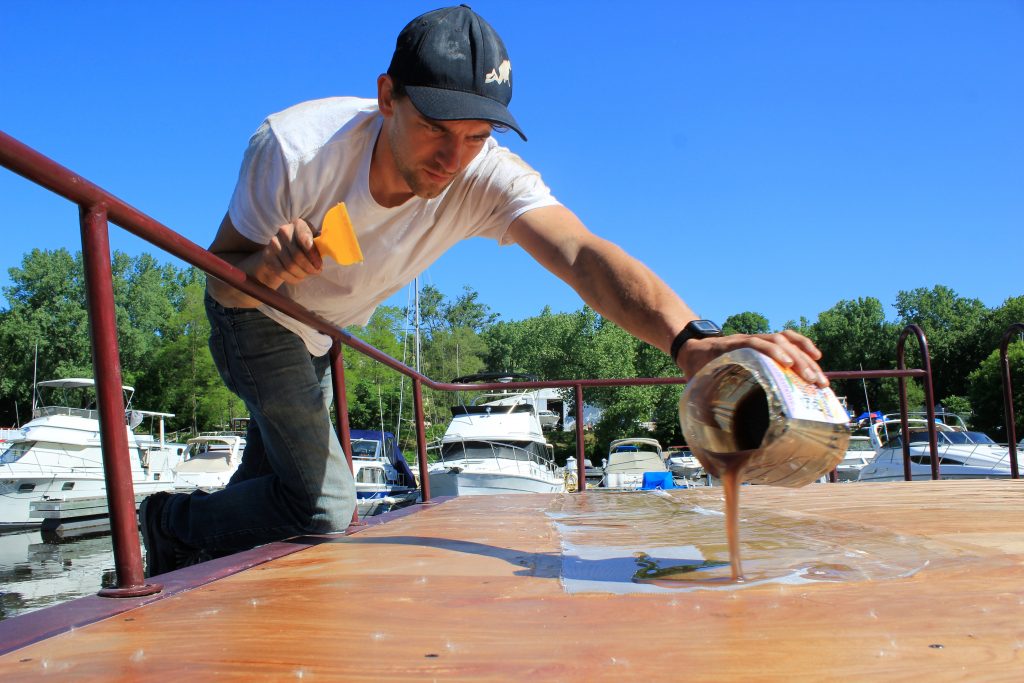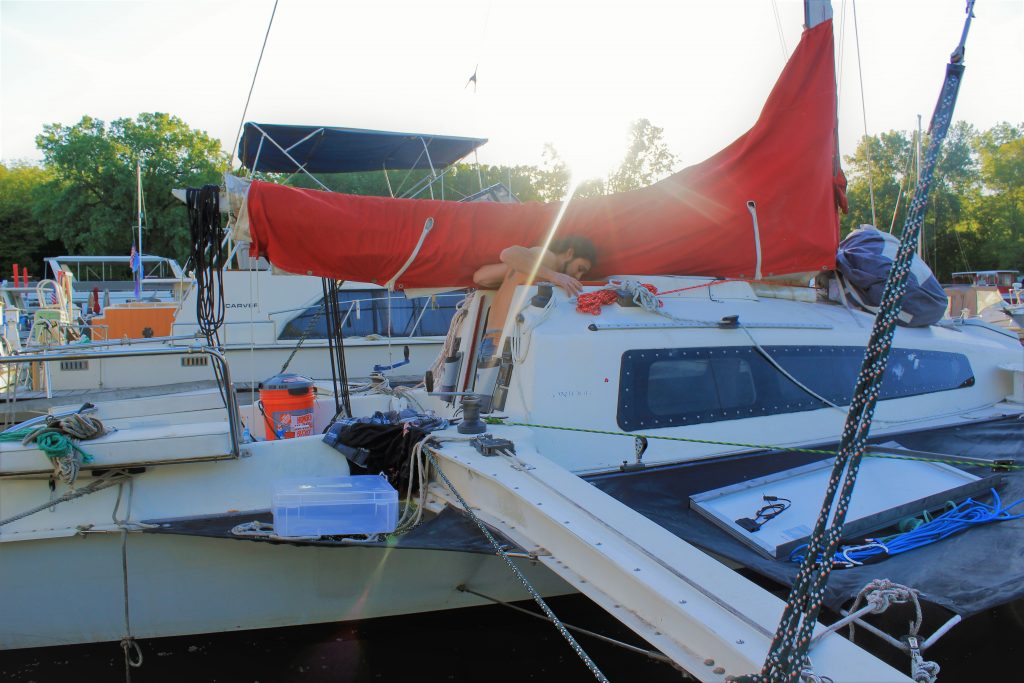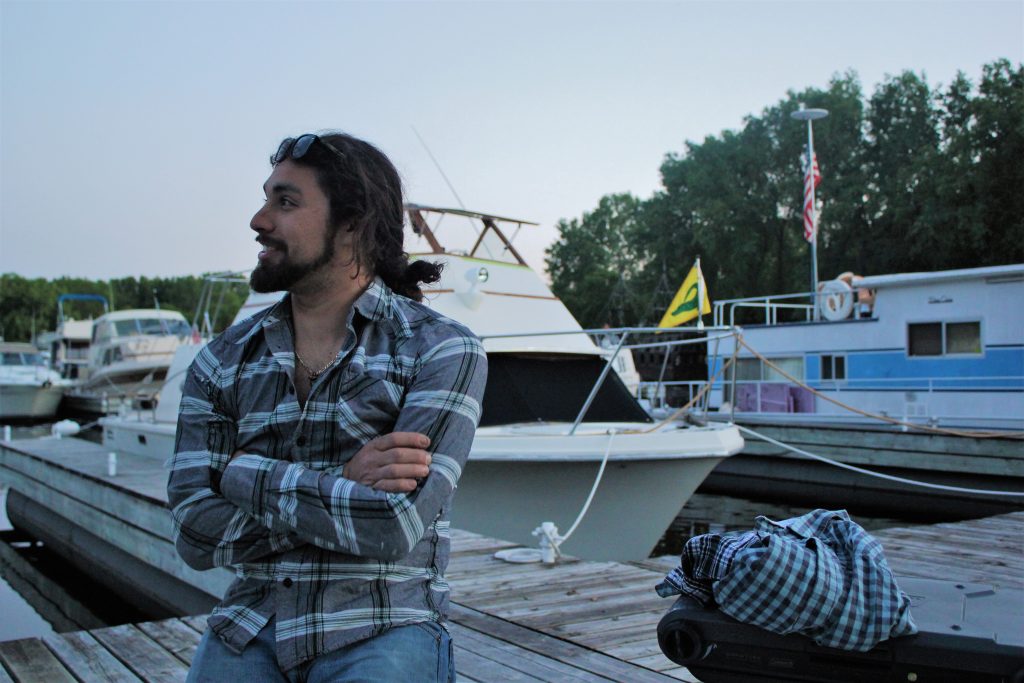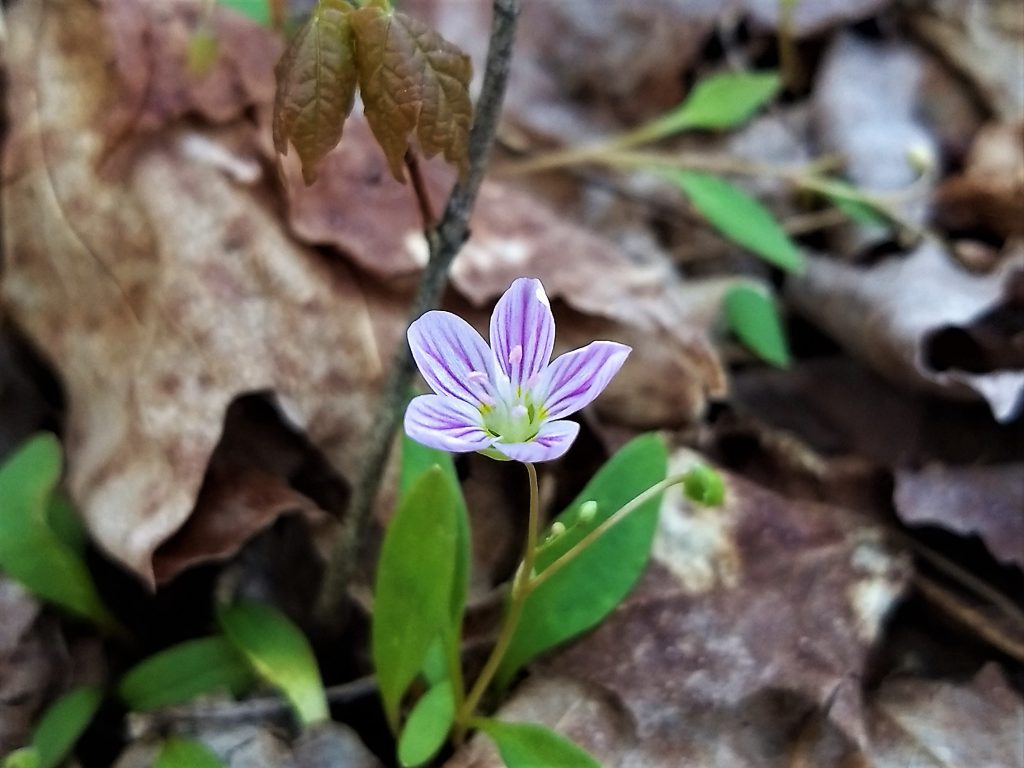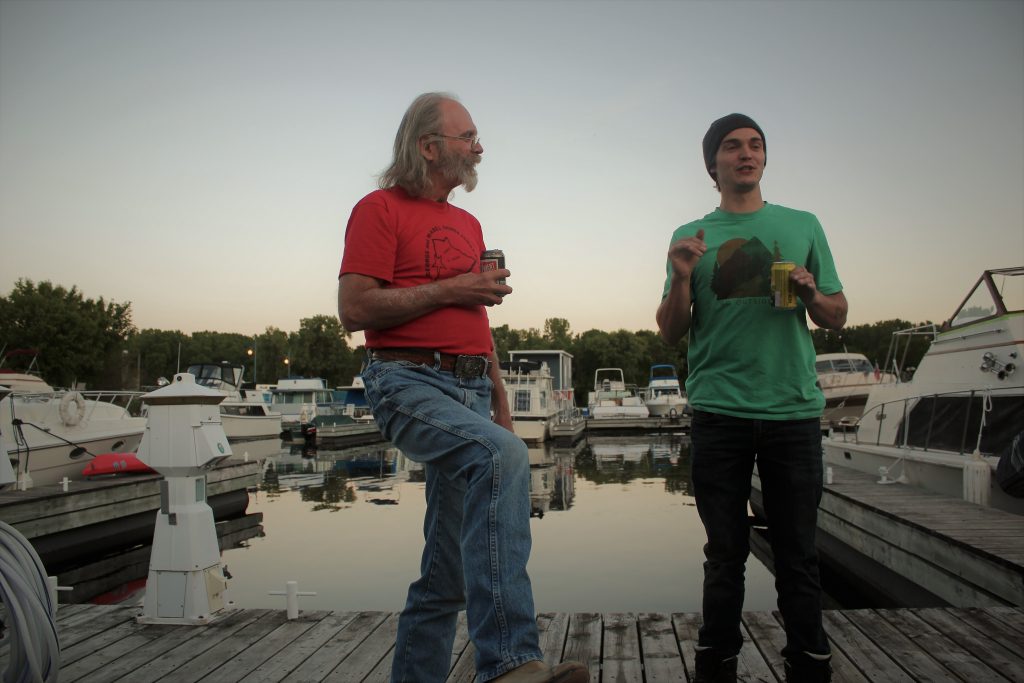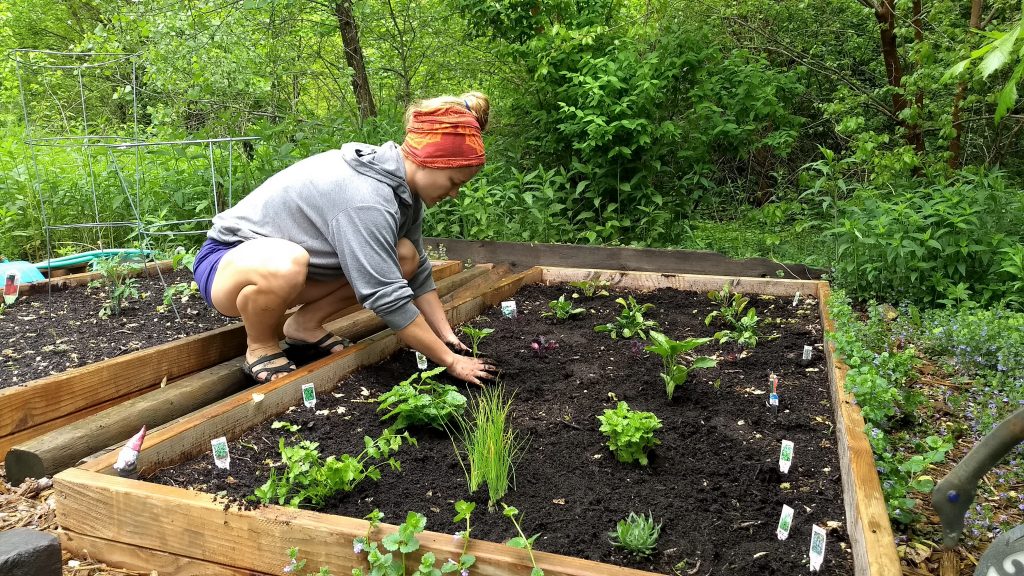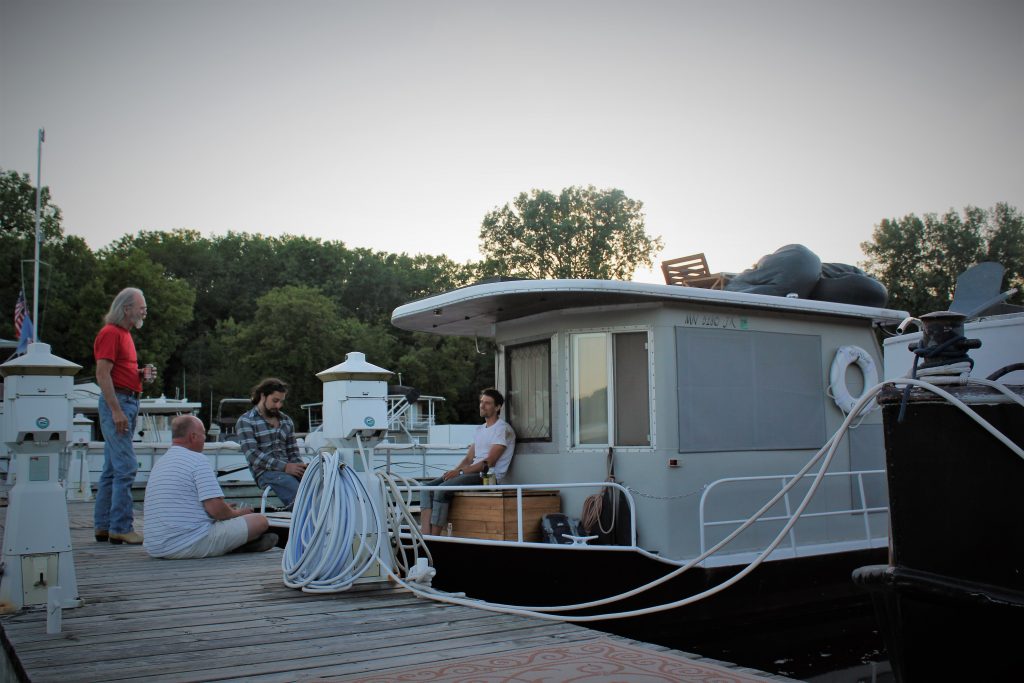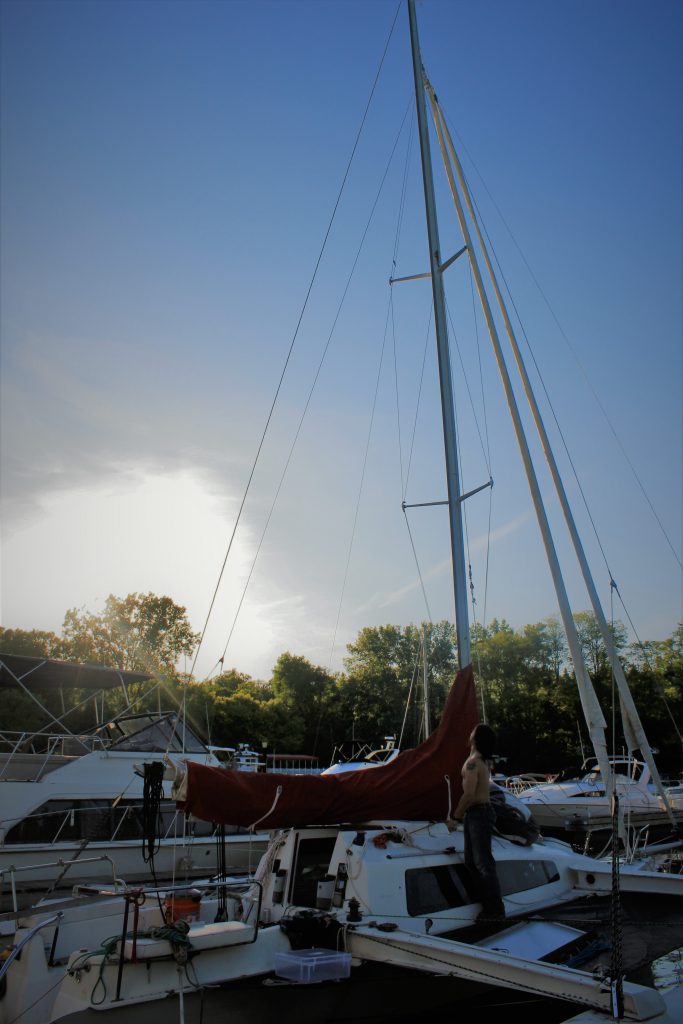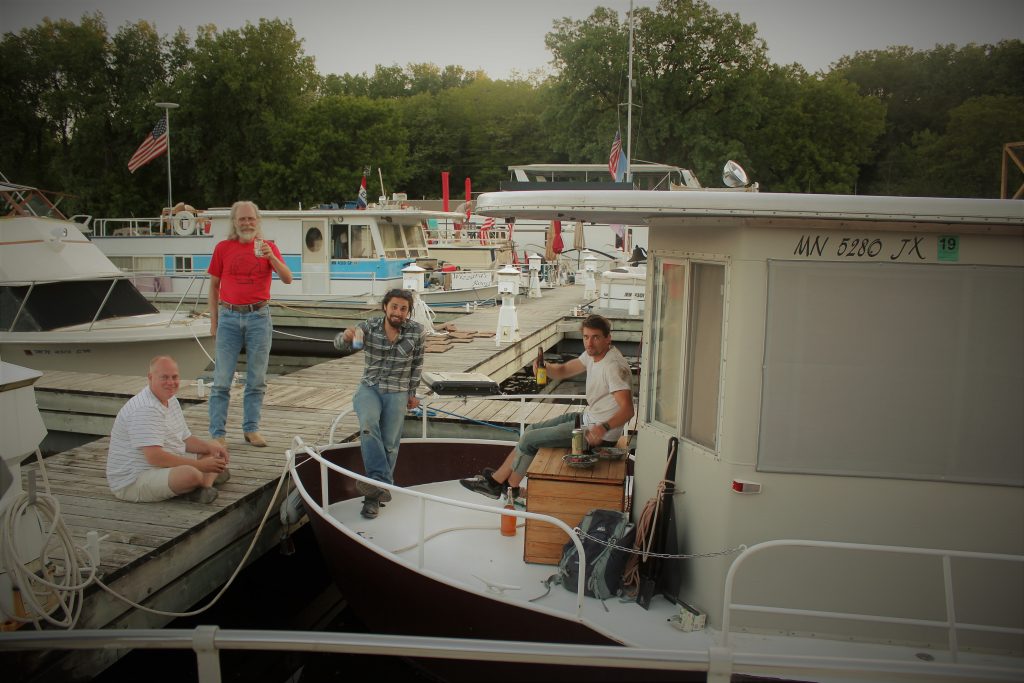As Minnesotans, we’re known for winter. We’re also known for Prince and “uffda” and lakes. That’s about where the list ends. I’ve come to believe that we’re on to something here: keeping our state low-key-cool. We don’t tell them about the perfect summer temperatures and the kickass small town festivals that go with it or the stuff heaven is made of in a Boundary Waters getaway. We don’t clue them in on the magic of the North Shore, that our cheese curds are better than Wisconsin’s, or that people are, like, super nice here. We’ll just let them (whomever “them” is?) go on believing that we’re all Grumpy Old Men with unbearable winters and sports teams that suck.
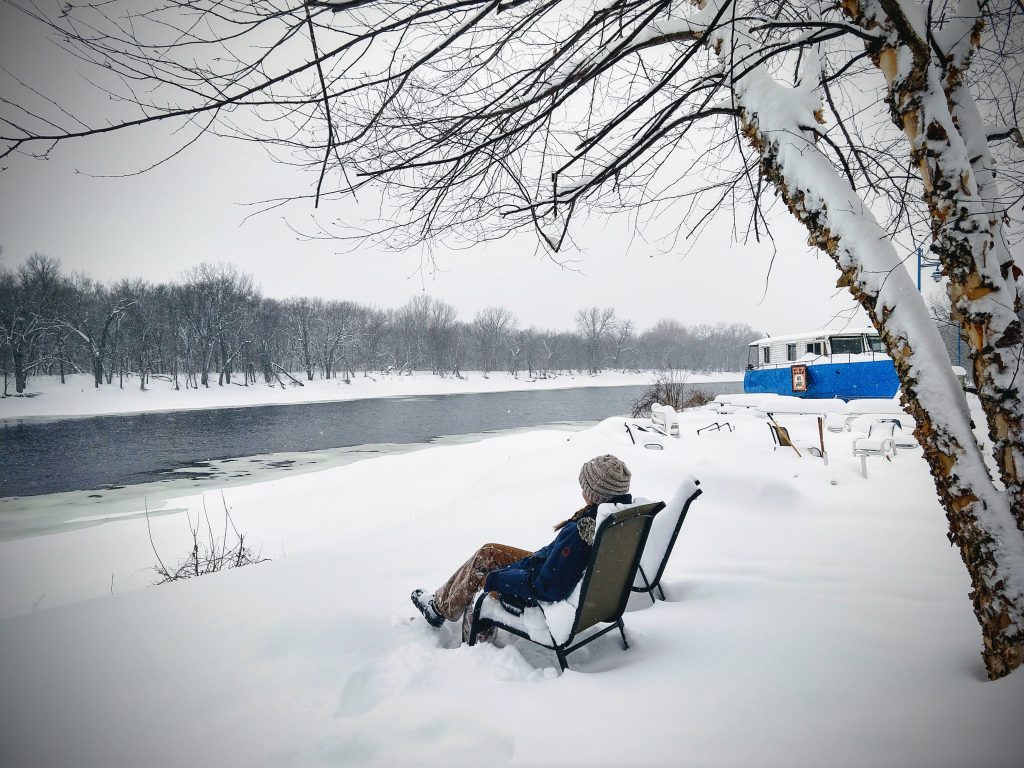
There is another secret tucked in to the upper Mississippi River valleys; one that even the locals haven’t heard of. No, it’s not the ancient paddlefish (as I’m sure you all were thinking). It’s the little pockets of liveaboards who dot the river’s shores. There’s not a lot of us but bye golly good gosh molly, we’re here alright- rain or shine, snowy or fine… (that sentence got weird). Anyway, the cat’s out of the bag: Minnesota has humans that live on boats all year; yes, winter included.
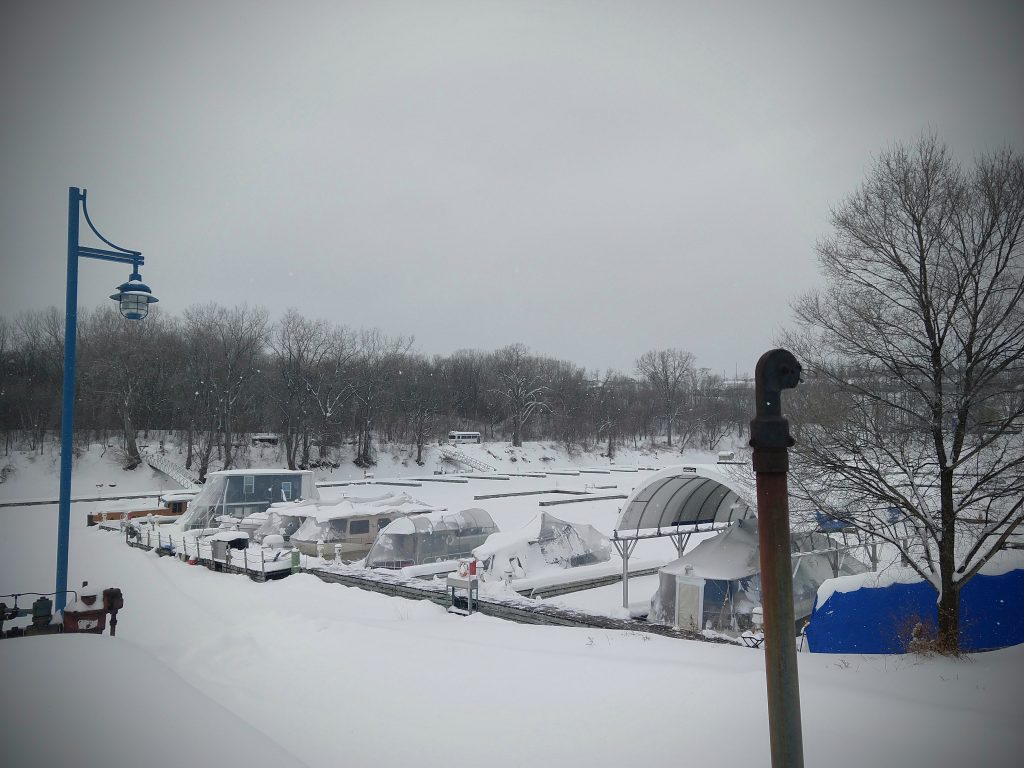
If there is ever a winter to look back on and think “man, that was the real deal”, it was this one. Winter of 2018-2019 was a beast. It had it all: the week-long negative 40 degree stretch and the record setting snowfall in the month of February. Then, out of nowhere, right before the spring equinox… boom, the melt! FYI: record setting snow one month and a fast melt the next = major flooding. More on that next time.
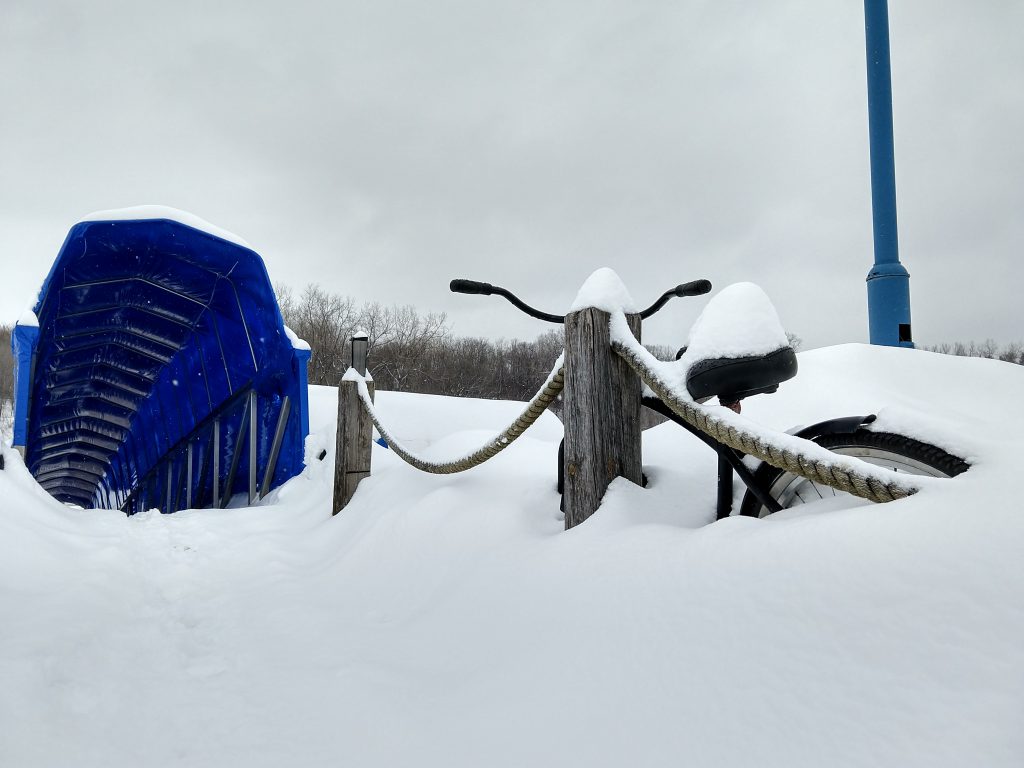
As far as weather goes, it takes a lot to shock a Minnesotan. We’re a hardy bunch that have bonfires in the winter, sit on buckets on frozen ponds with a pole in hand for fun, and shovel the driveway in shorts as soon as 30 degrees hits. In December, Michael observed a group of five die-hards surfing along the icy shores of Lake Superior…that’s some next level hardiness.
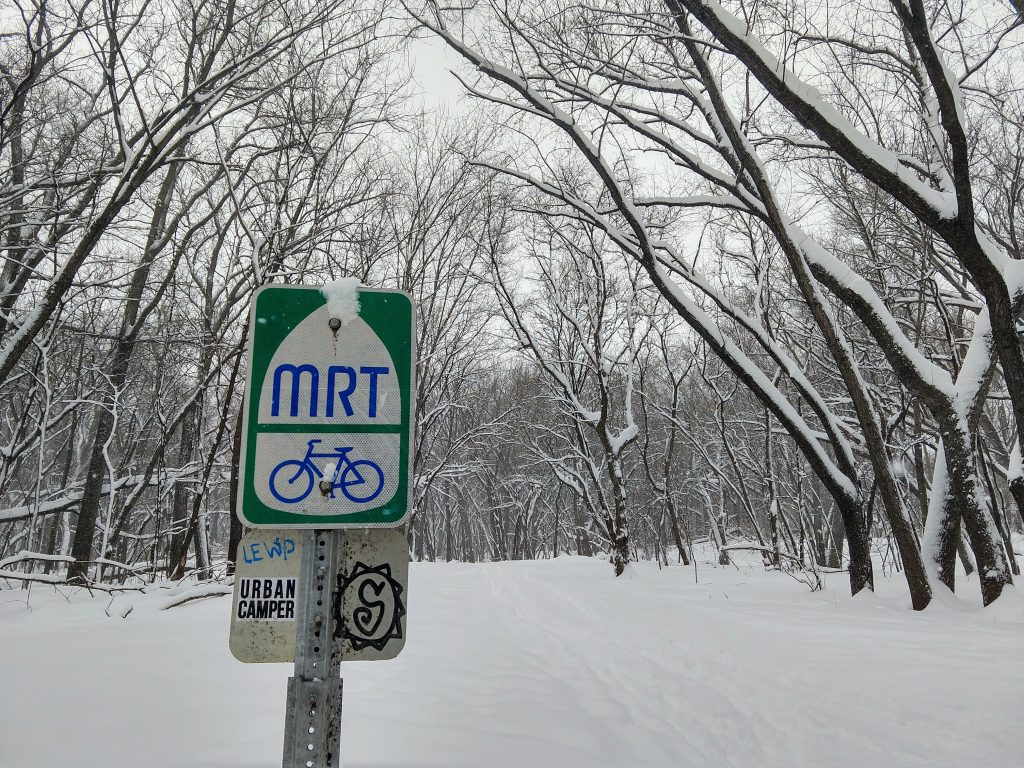
However, somehow, I never fail to surprise a fellow Land of 10,000 Laker when I tell them, “I live on a boat.” There’s always a strange pause like they’re trying to gauge if I just made a weird joke. The most common follow-up question during this winter season: “but you can’t live there now?” In an almost scripted way, I rattle off a cliff notes version of answers to all the questions I know will be asked next. Those include: is it actually in the water, does it freeze, how do you stay warm, is it warm enough, do you have water, do you have electricity, do you have a bathroom, and always, always, always, at the very end of the conversation: “huh, I didn’t know you could do that.”
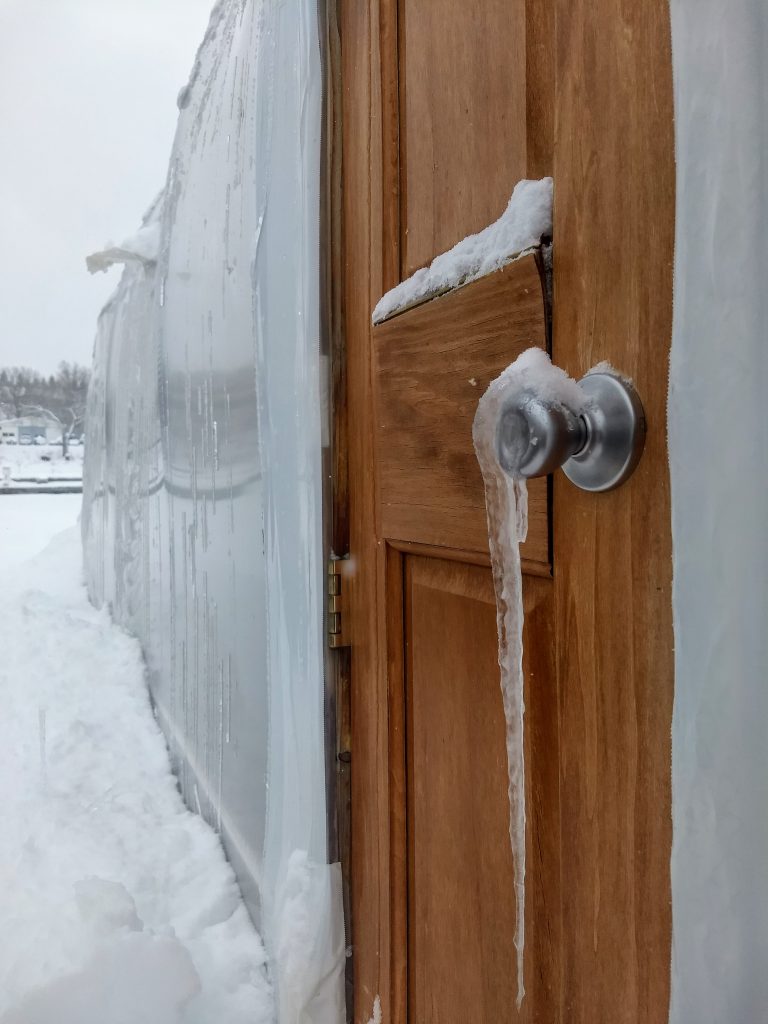
Yesterday, I frantically helped my neighbor disassemble his ice rink and warming huts when he told me “The city got a barge to come break up all this ice; they’re coming within the hour.” They came in twenty minutes.
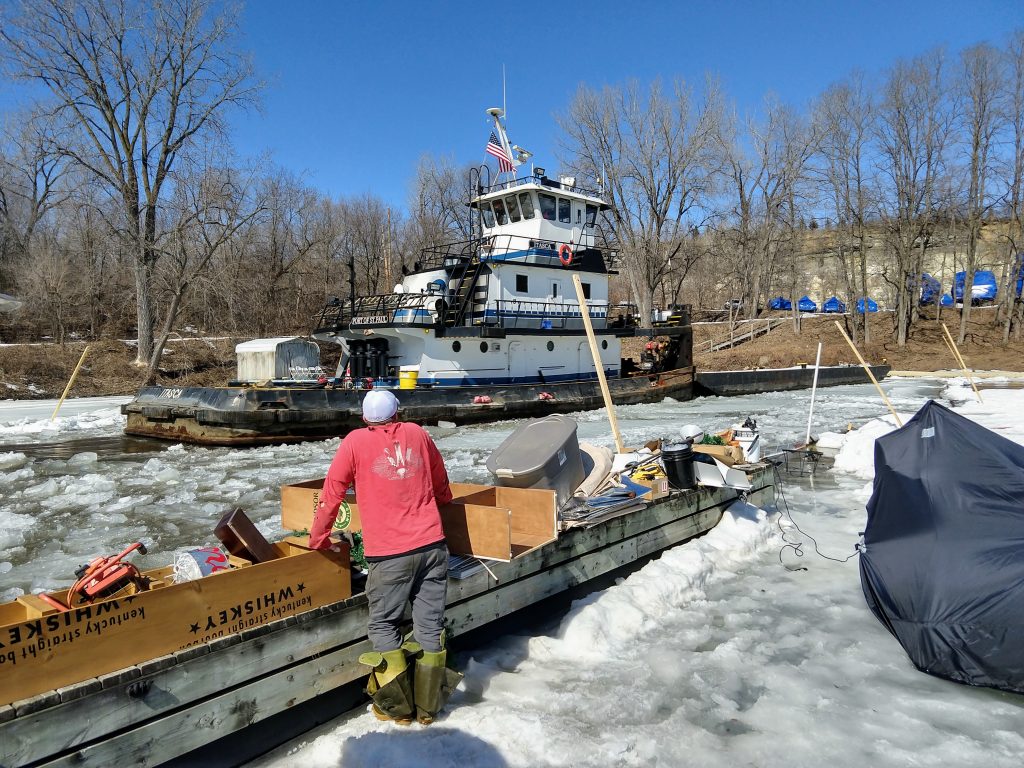
As we watched this barge demolish two-foot-thick ice, a woman named Linda came by. She wore a canvas vest like mine and was about thirty years my senior. I liked her instantly as she was curious and candid with an obvious wealth of river knowledge. She did puff hard on a cigarette as we spoke, but hey, no one’s perfect. As we talked, I found out that she lived aboard her boat year round in this marina for ten years. She still comes by to walk her dog and see how things have changed, or haven’t. We talk about the change of seasons, and we exchange the same ideas about the peace and calm of winter and the slightly overwhelming feeling that takes over as the boats get slipped back in for the summer. I laugh when she says, “You have to allow an hour for the five minutes it should to take you to walk to your car.” I had said that exact sentiment to a friend of mine that morning. I had explained to her that “yeah, summer is great with all the people back and all the energy, but as each boat drops in, a bit of our winter serenity leaves with it. In the summer, you have at least half a dozen people to talk to between you and your vehicle; you need to allow an extra forty minutes to walk down the dock.” Summer is a blast, but in the winter, the vibrant human energy leaves for land, and the marina belongs to the wild of Mother Nature again. Linda gets it.
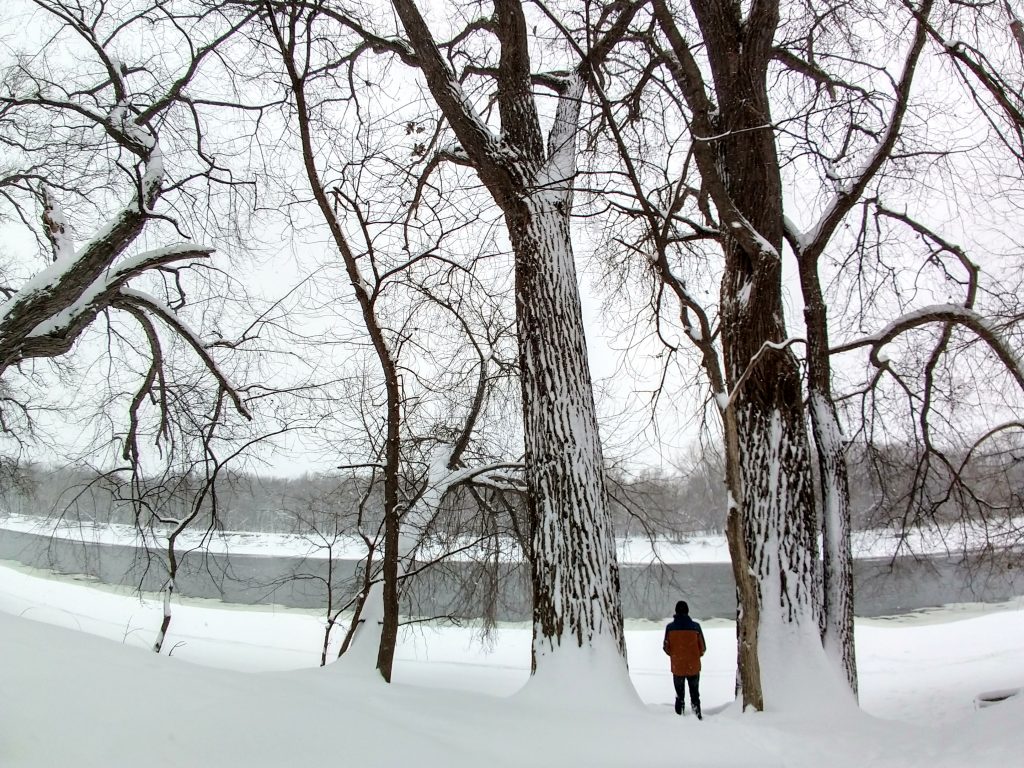
So, this winter had it’s usuals: the motley crew of ten boats that house thirteen people, three dogs, and one cat. We saw each other only rarely as we scuttled from boat to car to bathroom to boat to grocery store to boat to work to boat. We mustered the occasional outing: a bonfire on New Year’s Eve or a walk in the woods. Neighbor Eric was the star of getting out in the elements with his pond hockey team lighting up the far side of the marina on even the coldest nights. The winter wildlife sightings also included the usuals: beavers playing above and below the ice shelves, a coyote’s deer kill in the middle of the river’s frozen main channel, and bald eagles perched in the cottonwoods. There was also this big debate: was that a coyote or a wolf that Brody (Neighbor Mike’s German Shepherd) was playing with in the woods? As we eat chicken pork seafood gumbo on Ben and Pam’s boat after an icy sunset kayak session, a consensus is made. It was either a robust coyote well fed from easy dumpster food or a young wolf lost in the big city. So, the consensus was that there was no consensus.
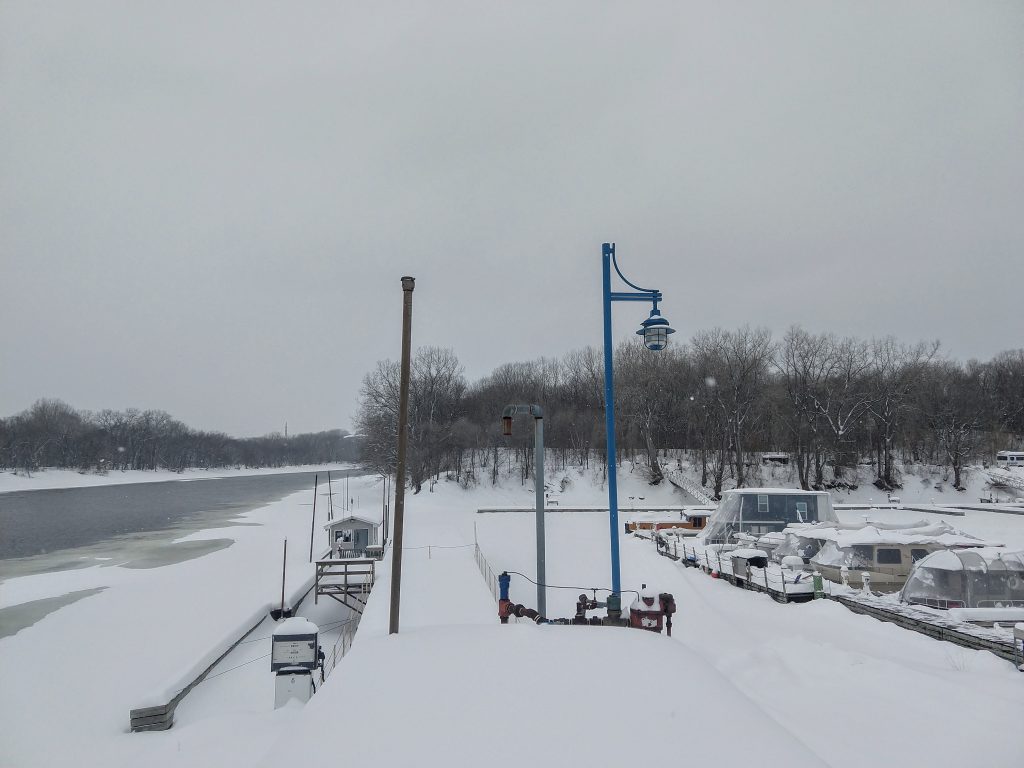
This winter also had many unusuals. The unusuals included a morning so icy that Neighbor Sam couldn’t get his truck up the hill to get out of the marina. He had to walk up the hill and Uber to work. Then there was January’s polar vortex deal that handed us wind chill temperatures down to 60 below. February brought us the snowiest February to date with 39 inches falling on Saint Paul. It was the fourth snowiest month of all months in recorded history here.
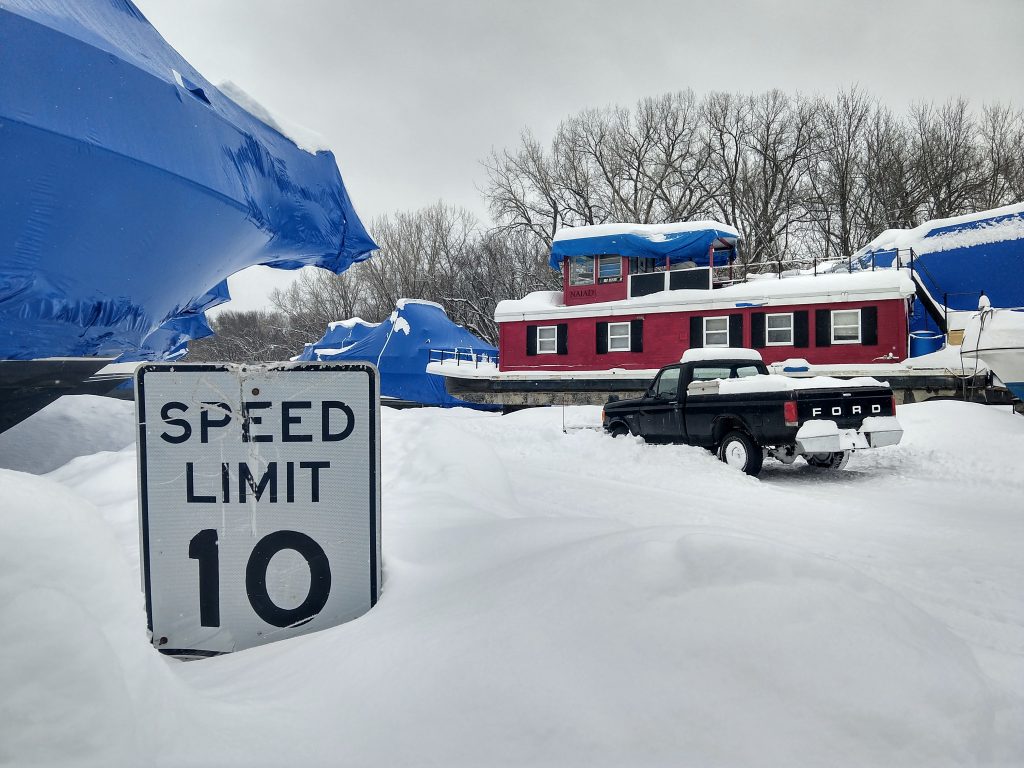
So, how does boat life fare in these conditions?… perfectly alright. A small place has small needs. We have two electric heaters and one propane heater aboard. We used all three once on the very coldest night, but one or two of those usually did the trick. Eight of the twelve windows were covered with Reflectix, a double bubble reflective foil that works to keep the heat where it belongs. The other four single pane windows were left as is so we didn’t feel like cavemen. Mental health matters when you exist within ten feet of your spouse for four good months.
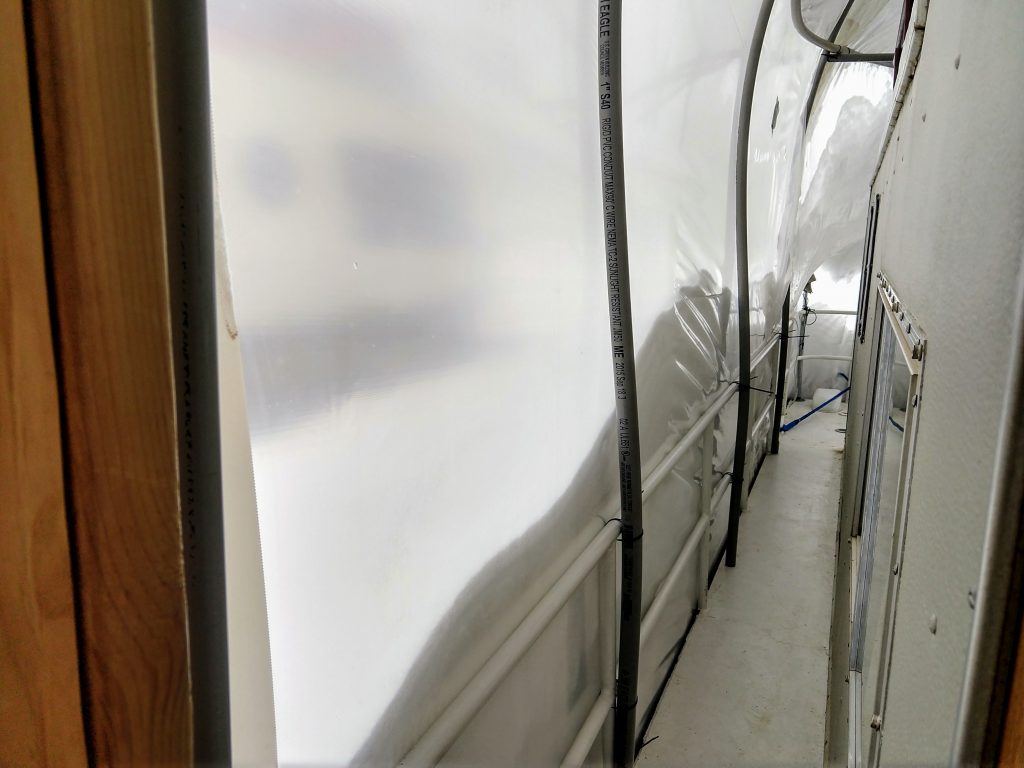
The most popular questions regarding winter life aboard revolve around intake and output: do we have access to water and how do we expel that intake. In other words: how are we drinking and where do we shit. Before the freeze hits, all water sources are turned off except for one hose or series of hoses that lies deep below the water’s surface where it won’t freeze and runs across the whole of the marina to reach us. It would be about three hundred feet of hose. The hose runs up to the middle of the dock to meet the needs of all thirteen humans, three dogs, and one cat. The hose must be left on to trickle just enough water through to prevent the hose from freezing to a stop. There are two things that can and have gone wrong with this one and only hose, the hose we all depend on for our sole life-giving water source. The first of these happened last winter when someone turned the water completely off after use and left the hose to freeze shut. Just like that, the whole community was waterless until the spring’s thaw. The second thing that can go wrong with our precious well is that someone can simply drop the hose in to the dark abyss of the Mississippi waters never to be recovered. We had a close call like this in November when I came home to four of my neighbors gathered around a dock finger fishing around with boat hooks. I walked in to a tense situation in which someone had dropped the hose in. The group knew approximately where the drop occurred and had been fishing around for some time. One neighbor asked why it was moved in the first place when it was originally secured tight elsewhere. Others were in quiet desperation, hoping this wouldn’t end our water supply already when winter had hardly even started. In a moment of good fortune, the hose was recovered and tied tight again with a pact amongst us all not to move it. The boat owner’s own hose must be brought to the anchored hose and connected there rather than detaching the precious anchored hose which would risk another drop-in and result in a community-wide water famine.
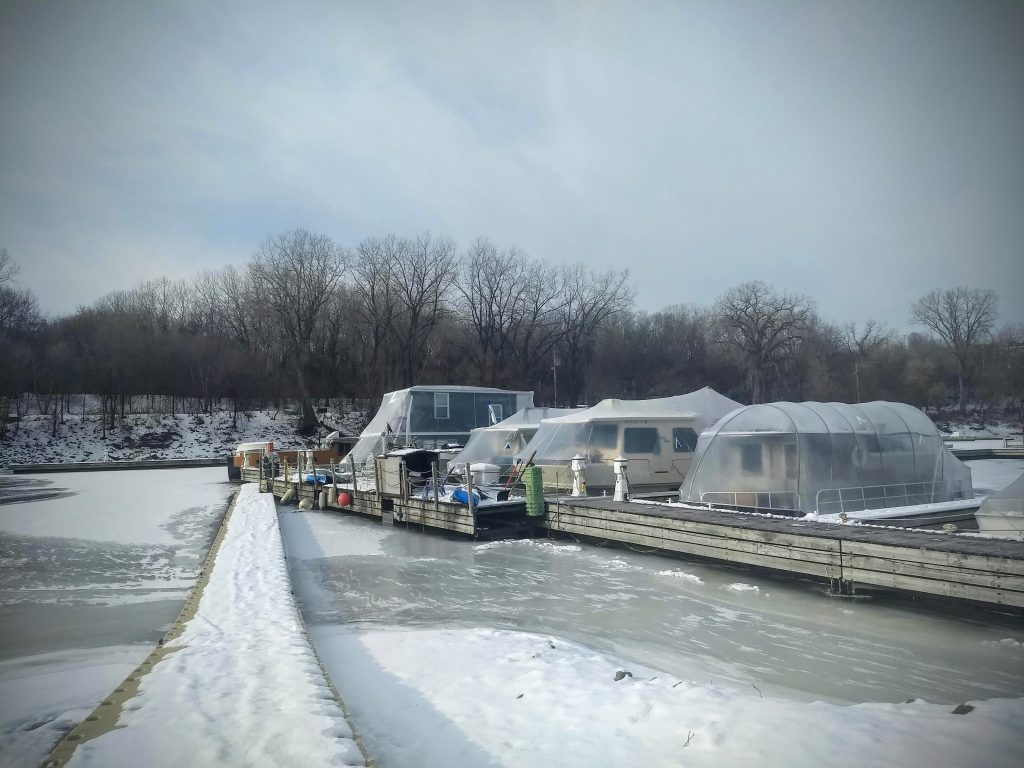
So, having a working water source, that is step one. We have a twenty gallon holding tank under our bow that we fill with this water. A water pump transports that water to the five gallon water heater and to our sinks. To get the water from the holding tank to our mouths or dishes or wherever also has it’s problems. If it’s less than ten degrees outside, the water pump does nothing. If it’s above ten degrees but below freezing, the pipes might be frozen as the water pump tries to push water through. We’ve had a pipe bursting incident twice this way. If we do get water from the sink but the ice or snow is frozen around the through hull were the sink water exits, our sink fills with water until we break the ice and unfreeze the water sitting in the exit pipe. Basically, we have a fully operating water system for about 35 percent of the winter months.
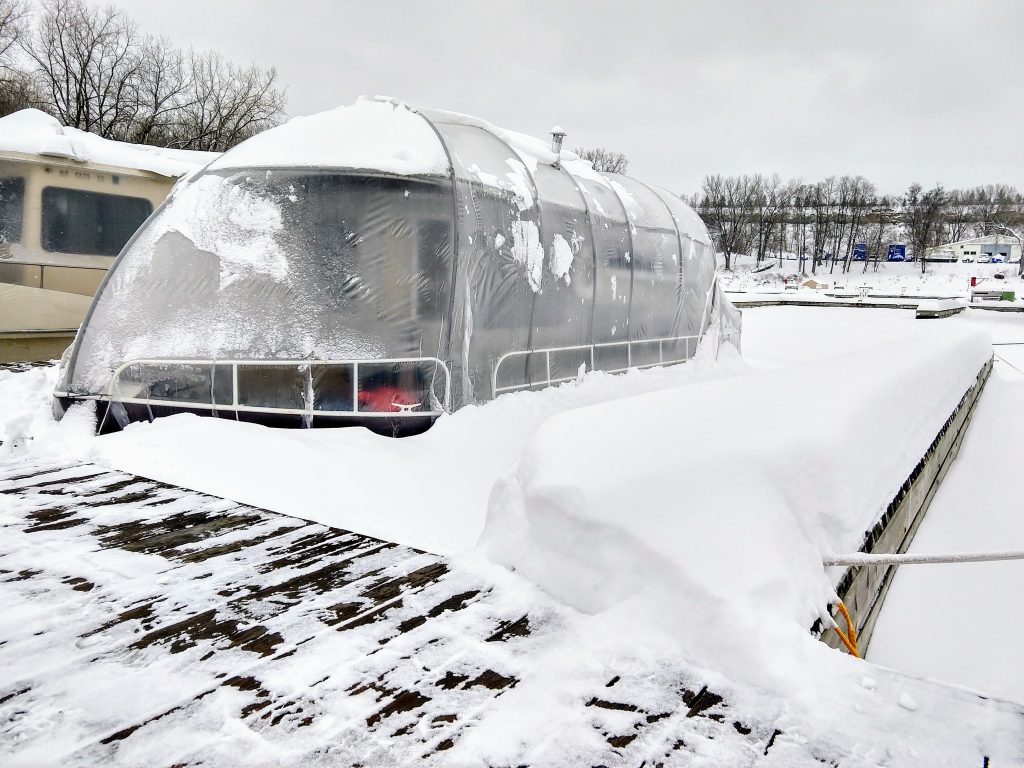
Alright, next question. “How do ya shit?” It’s a common liveaboard practice to avoid poops aboard altogether. It’s ideal to have a system that can handle all butts and everything that comes out of them, but even if you do, it lands in a contained system that requires a pump out. If you have a moving boat, pump outs are a breeze. You go to the gas dock, buy a touch of gas so you’re pump out is free, and get the pump hooked up to your holding tank’s deck fitting to suck out all the good stuff. In the winter, it’s not as accomodating. Our marina offers pump outs that come to you every few weeks but that pumpout date might not land on or near the date that your holding tank is full and starts to smell, and it costs two hundred dollars for the season.
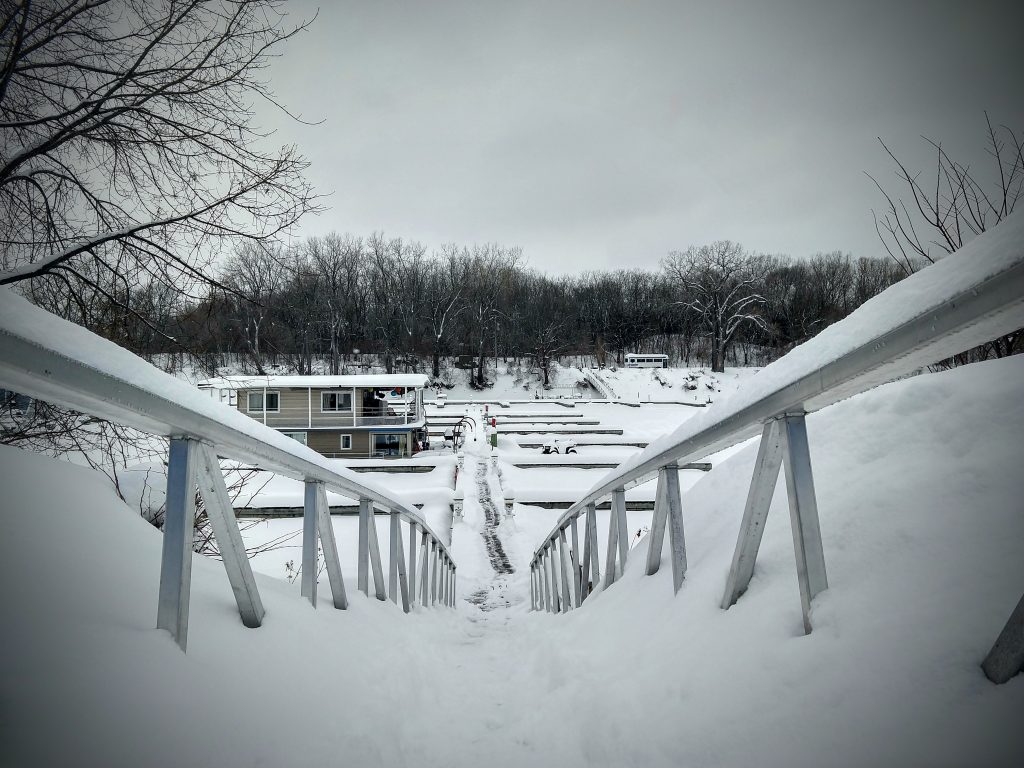
Our holding tank recently had a particularly stinky issue with a malfunctioning venting system. Basically, our toilet burped up every smell that went into it. So, Michael and I made the decision to avoid boat poops altogether, and instead, hike our butts to the port-a-potty or to the marina’s shop to take care of business. Basically, our daily deliverance require much more forethought these days. After a stint of peeing into a pickle jar (I don’t want to talk about it), we changed our output system altogether. We didn’t want to rely any longer on the bi- or tri-weekly pumpout, and we were not loving the poorly ventilated system that burped back at us. We decided on a more primitive but less dependent situation. We got a five gallon portable toilet with a flush feature for seventy bucks. When the waste compartment is full, it’s emptied in to the port-a-potty up the dock: easy peasy, cheap, and no stink. Perhaps it’s the pickle jar experience talking, but to me, this is luxury.
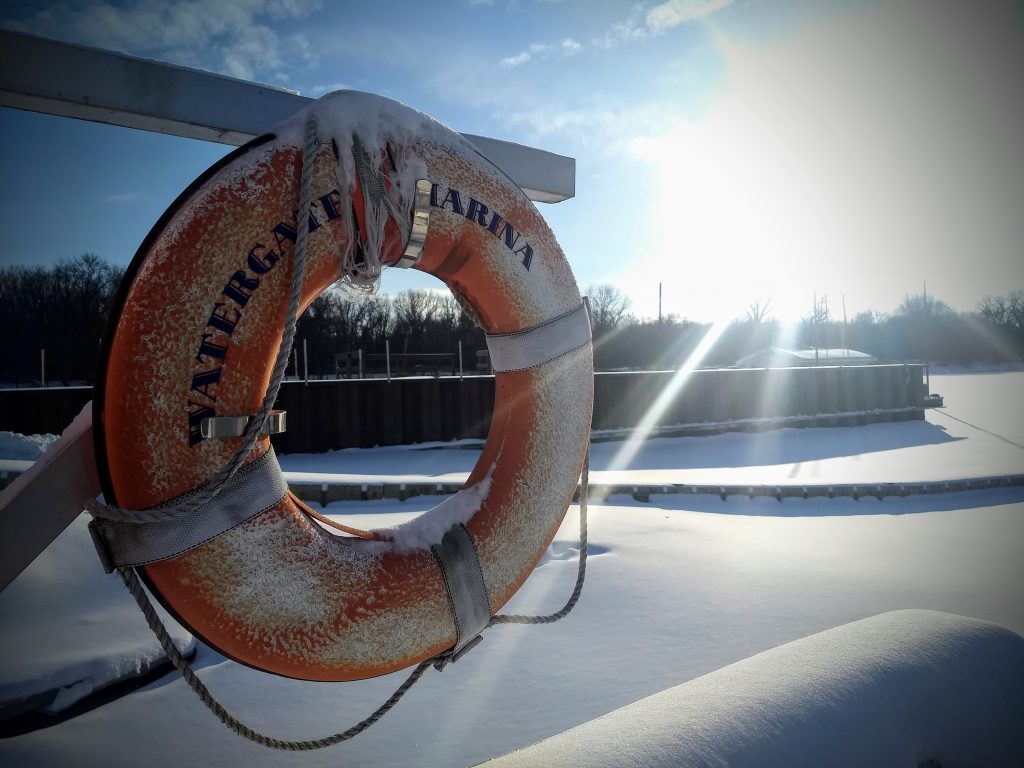
Well, now that we got the intake and output talk out of the way, where do we go next? I mentioned Neighbor Eric’s killer ice rink within the marina. I’ve never been a hockey player nor can I really skate but his pond hockey situation makes me think that I’m missing something. He’s got lights that surround the rink and a warming hut that has beer and the ambiance of a cozy Irish bar. He skates from boat to rink every night. Sometimes, I fall asleep to the sound of hockey which I love. Other nights, I fall asleep to the sound of someone chipping ice around their boat. Fiberglass boats can’t freeze in or their hull would be done for, so winter requires a bubbler that keeps the water moving and an ice chipping tool (a 2×4 with a rope tied to it is a popular one around here) to augment the process. We are fortunate to have a steel hull on our boat which means we freeze right in; no problem.
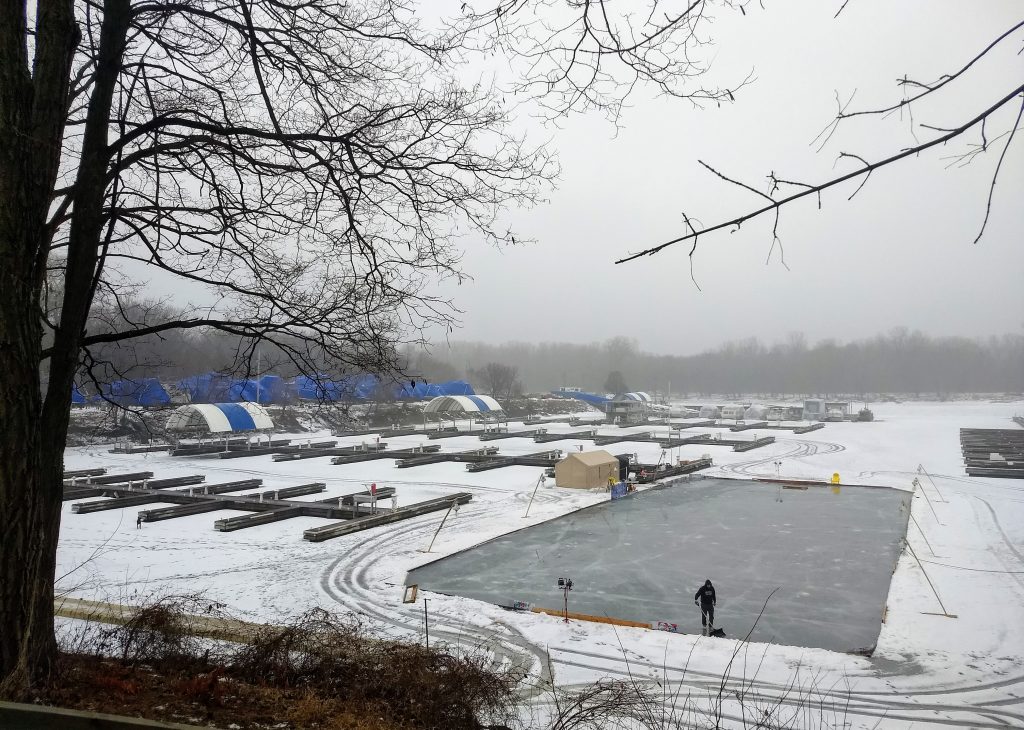
So, here’s the conclusion. Winters in Minnesota suck and are also awesome. They make us hardy. They make us grateful. Minnesotans can surf Lake Superior in the winter, and, if we so desire, we can live on a boat in the winter. We can live in a house too, with a driveway that we shovel while wearing a pair of shorts. We can cheer on sports teams that suck and have a good time doing it. We can be nice but sometimes grumpy. We can say “uffda” or whatever word we want in whatever language we want when we wake up to a foot of snow on our car. We can always find a river or lake, but sometimes, it will be frozen. We’ll fish on it anyway. We might have a real deal winter like this one that brings days where we sleep with a scarf on or pee in a pickle jar… am I losing you now? Anyway, let the world believe we’re Grumpy Old Men with shitty sports teams. I like it that way.
Stay low-key-cool Minnesota.
Love Always, Your Neighbors Aboard
